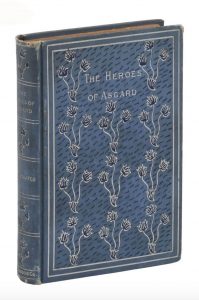Recent stories relating to TS Eliot
———————————————————————————————————-
T.S. Eliot, pluralism, and the word ‘and’, February 2026
Some aspects of The Waste Land, and Eliot’s use of the word ‘and’,  are considered in an essay by Seamus Perry on ‘Pluralism and the Modern Poet’ in the forthcoming issue of the London Review of Books (19th Feb),
are considered in an essay by Seamus Perry on ‘Pluralism and the Modern Poet’ in the forthcoming issue of the London Review of Books (19th Feb),
A broad consideration, ranging across several 20th century poets and philosophers, leads from William James via F.H. Bradley to T.S. Eliot and The Waste Land, “not a poem about absolute idealism; still, the curious sense of metaphysical nostalgia that haunts its broken forms must have some relation to ‘the melancholy grace, the languid mastery’ that Eliot found in Bradley. The poem feels like it inhabits, and depicts, a world that lacks the saving authority of a justification, of a something that underwrites it.”
Professor Perry goes on to consider the word ‘and’, “a hallmark pluralist word”, beginning with Eliot’s use of it during the typist episode in his allusion to Goldsmith. “The little word undoes the old rhythm of the original and scuppers the rhyme scheme too: more, it leaves the little word isolated, as though in sympathy with the solitary woman, at the end of the line, where it has no business to be, and thereby placing on it an unexpected emphasis.”
Perry quotes the observation by William H Gass that the general form of the word ‘and’ is “a simple ‘next!’” However, he writes, “For Eliot’s sad typist in The Waste Land, it’s an ominous and defeated ‘what next?’, as in Dorothy Parker’s ‘what fresh hell can this be?’”
The essay can be read in full here.
———————————————————————————————————-
Winter issue of our Society quarterly published, February 2026
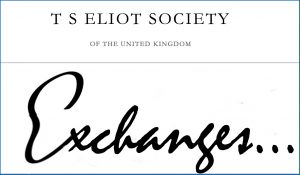 The Winter issue of our Society quarterly, Exchanges…, is now available for download.
The Winter issue of our Society quarterly, Exchanges…, is now available for download.
Its contributions from members include an item on reading Four Quartets on Good Friday; a review of Adrian Dunbar’s ‘multimedia’ presentation of The Waste Land; our annual consideration of the new T.S. Eliot Prizewinner; and one member’s first introduction to the works of T.S. Eliot.
You can download this new issue here.
———————————————————————————————————-
Programme released for 2026 T.S. Eliot International Summer School, February 2026
 Programme details have now been published for the 2026 T.S. Eliot International Summer School.
Programme details have now been published for the 2026 T.S. Eliot International Summer School.
The School will be held at Merton College, Oxford, from 4th to 12th July 2026, under the auspices of Executive Director Anthony Cuda. This year’s speakers include Jayme Stayer, Frances Dickey, John Whittier-Ferguson, Rick de Villiers, and the Eliot archivist Nancy Fulford. Subjects include Eliot and Plath, Eliot and Donne, Sweeney in St Louis and ‘La Figlia che Piange’.
The Summer School includes visits to Burnt Norton, and to the Annual T.S. Eliot Festival at Little Gidding.
Full details of the current programme, speakers, fees and scholarships can be found here.
———————————————————————————————————-
TLS and Literary Review consider Eliot’s Letters Vol 10, February 2026
Significant reviews of The Letters of T.S. Eliot Vol. 10 1942-1944 have recently been published. (The volume itself was published in July 2025.)
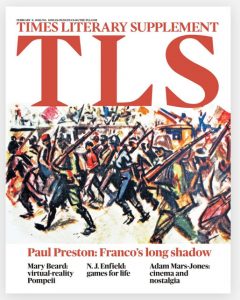 In the TLS, 6th February, Peter McDonald writes that “The war is far from over in this tenth volume of Eliot’s Letters, but what comes to an unforeseen end is the course of nearly all his poetry.” ‘The exasperated spirit: T. S. Eliot’s wartime correspondence’ is here. (£)
In the TLS, 6th February, Peter McDonald writes that “The war is far from over in this tenth volume of Eliot’s Letters, but what comes to an unforeseen end is the course of nearly all his poetry.” ‘The exasperated spirit: T. S. Eliot’s wartime correspondence’ is here. (£)
While in the December 2025 Literary 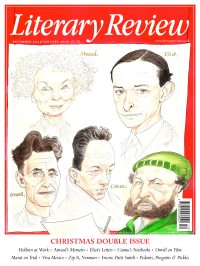 Review, Robert Crawford writes of “the almost overwhelming daily minutiae of these splendidly edited letters.” ‘Advice to poets’ is here. (£)
Review, Robert Crawford writes of “the almost overwhelming daily minutiae of these splendidly edited letters.” ‘Advice to poets’ is here. (£)
———————————————————————————————————-
Colm Tóibín on T.S. Eliot, January 2026
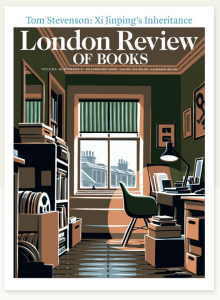 In a full-length essay in the London Review of Books, Colm Tóibín considers ‘Yeats, Auden, Eliot: 1939, 1940, 1941’
In a full-length essay in the London Review of Books, Colm Tóibín considers ‘Yeats, Auden, Eliot: 1939, 1940, 1941’
The early part of the essay focusses upon Yeats, and his poem ‘Cuchulain Comforted’. Following Yeats’s death, attention turns to Auden’s elegy, ‘In Memory of W.B. Yeats’. Then, Tóibín describes the circumstances surroundingthe lecture on Yeats that Eliot gave at the Abbey Theatre, Dublin. “[Eliot] noted,” writes Tóibín,“that he himself, during his short stay, dropped his customary ‘Curzon-like aloofness’ and took on what he called ‘a mask of playful blarney’, which must have been appreciated.”
Tóibín then considers ‘Little Gidding’ at length, and the ‘familiar compound ghost’ and its relationship to Yeats in particular. He compares Yeats’s ‘Ireland’ with Eliot’s ‘England’.
And he asks how, “Since Eliot’s Englishness was a kind of pose, how could he, a master of self-examination and self-doubt, be sure that his interest in prayer was not also a pose?”
He observes that “it is very hard to pray if your relationship to words themselves is as fastidious, suspicious, self-conscious and filled with doubt as Eliot’s was.”
“It is [Eliot’s] task to see if he can lure us into assenting to all the paradoxes, improbabilities and strangenesses that fill ‘Little Gidding’,” he writes. “Since the poem is concerned with the space between High Holborn and the high heavens, a great deal depends on its not being a flop.”
He concludes that “While ‘the fire and the rose’ in the last line do what they can to convince us, this England of Eliot’s lured us further into – if not philosophical belief, then at least some kind of poetic assent.
The essay is here.
———————————————————————————————————-
T.S. Eliot and C.S. Lewis, January 2026
 In an online article, ‘C.S. Lewis and T.S. Eliot: A Tale of Two Critics’, Jackson Greer traces the history of the relationship between the two men, and how it turned from enmity to affection.
In an online article, ‘C.S. Lewis and T.S. Eliot: A Tale of Two Critics’, Jackson Greer traces the history of the relationship between the two men, and how it turned from enmity to affection.
By 1926, Lewis had read enough of Eliot’s poetry to conclude it a great waste and devised a prank against Eliot that involved submitting mock-modernist poetry toThe Criterion. He would mock Eliot’s opening stanza from Prufrock in his own poem, “A Confession,” writing, “For twenty years I’ve stared my level best / To see if evening–any / evening–would suggest / A patient etherized upon a table; In vain. I simply wasn’t able.”
But they were brought together in 1959, summoned by the Archbishop of Canterbury, to serve on the Committee to Revise the Psalter. “It appears that while they worked on the committee to preserve much of the Coverdale translation, which they both loved deeply, the personal gulf between the men was bridged.” Lewis is subsquently quoted as remarking that “You know that I never cared for Eliot’s poetry and criticism, but when we met I loved him at once.”
The article can be read in full here.
———————————————————————————————————-
Call for conference papers on Lancelot Andrewes and T.S. Eliot, January 2026
A two-day conference at Pembroke College,  Cambridge in September 2026 will mark the 400th anniversary of Lancelot Andrewes’ death. It also marks the 100th anniversary of the essay by T. S. Eliot which appeared first in the TLS and was later collected into the volume named after it: For Lancelot Andrewes.
Cambridge in September 2026 will mark the 400th anniversary of Lancelot Andrewes’ death. It also marks the 100th anniversary of the essay by T. S. Eliot which appeared first in the TLS and was later collected into the volume named after it: For Lancelot Andrewes.
“This essay instigated modern critical interest in Andrewes’ intellectual and imaginative legacy,” say the organisers, “and is a significant event not just for sermon studies but for the conjunction of modernism and early modernism, and the influence of the renaissance period on the poets and thinkers of the twentieth century and beyond.”
“This two-day conference, to be held at Pembroke College and the English Faculty in Cambridge, will invite participants to consider the current state of Andrewes criticism, and to think in new ways about the wider legacies of Eliot’s essay – and indeed his other criticism on early modern writers.”
In addition to the usual 20-minute papers, the organisers encourage some shorter, more creative responses to the subject (paraphrases, imitations, reflections). “We also envisage one panel where participants will offer brief (10-minute) responses to a particular sermon (this is likely to be Nativity 1610).”
Abstracts of papers are invited by 12th January, and full details of the conference are here.
———————————————————————————————————-
Eliot Christmas cards, signed books, letters and more for sale, January 2026
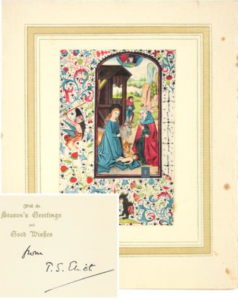 A fascinating list of items related to T.S. Eliot has been put up for sale by Blackwell’s Rare Books.
A fascinating list of items related to T.S. Eliot has been put up for sale by Blackwell’s Rare Books.
Among 35 items, the books listed and pictured include First Editions and signed copies of Eliot works including After Strange Gods and The Cultivation of Christmas Trees, and a set of the first individual Faber printings of Four Quartets. In addition, the items include several Christmas cards signed and sent by Eliot; letters from Eliot; and, unusually, Eliot-related artworks, a musical score and a vinyl recording.
The list with images can be seen as a PDF here.
———————————————————————————————————-
Murder in the Cathedral available on BBC Sounds, January 2026
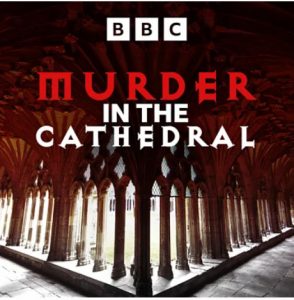 The audio production of Murder in the Cathedral, broadcast on BBC Radio 4 on 27th December, is available to hear for a limited period on BBC Sounds.
The audio production of Murder in the Cathedral, broadcast on BBC Radio 4 on 27th December, is available to hear for a limited period on BBC Sounds.
The 1hr 27min production stars Danny Sapani, and full details and a link to listen are here.
———————————————————————————————————-
T.S. Eliot quoted in King’s Christmas broadcast, December 2025
 In his 2025 Christmas broadcast, King Charles quoted from T.S. Eliot’s Burnt Norton.
In his 2025 Christmas broadcast, King Charles quoted from T.S. Eliot’s Burnt Norton.
“Journeying is a constant theme of the Christmas story.” said the King, citing the journeys of the holy family, the wise men and the shepherds to Bethlehem.
“Indeed, as our world seems to spin ever faster, our journeying may pause, to quieten our minds – in TS Eliot’s words ‘At the still point of the turning world’ – and allow our souls to renew.
“In this, with the great diversity of our communities, we can find the strength to ensure that right triumphs over wrong.
The full broadcast is here.
———————————————————————————————————-
Is the story of Eliot’s Royal reading of The Waste Land untrue?, December 2025
 An online article claims that a legendary story of a private reading by Eliot of The Waste Land to the Royal family is untrue.
An online article claims that a legendary story of a private reading by Eliot of The Waste Land to the Royal family is untrue.
Mark Forsyth repeats in full A.N Wilson’s notorious 1990 report in The Spectator, where Wilson recounted a conversation with the late Queen Mother, in which she recalled a private reading by Eliot of The Waste Land to her and the teenaged Princesses Elizabeth and Margaret at Windsor Castle. In the story, the two princesses suffer a fit of the giggles; the poem itself is remembered as The Desert; and the Queen Mother recalls that “Eliot looked as though he worked in a bank, and we didn’t understand a word.” The story has since been widely repeated.
“You wouldn’t think it was incorrect, until you start sniffing,” writes Forsyth, quoting the story in full. “If you sniff, everything smells wrong.”
Forsyth is a prolific writer, also known as The Inky Fool. whose books include The Etymologicon, The Horologicon, and The Elements of Eloquence. He says of the Royal story that “It’s interesting because you can, or at least I did, trace the source, see everything that’s wrong with it, and then discover the truth.”
He suggests in turn that each individual element is almost certainly untrue, and that perhaps the memory relates to a 1943 reading by a dozen poets, including Eliot, at the Aeolian Hall in London.
His article is on his Inky Fool blog here.
———————————————————————————————————-
Book from TS Eliot’s childhood for sale, December 2025
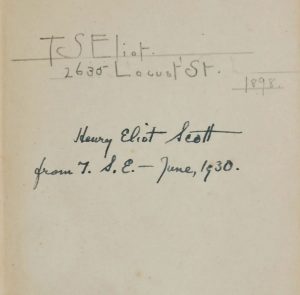 A dealer in the US is selling one of Eliot’s childhood books, owned by the poet when he was just ten, and bearing his ownership inscription.
A dealer in the US is selling one of Eliot’s childhood books, owned by the poet when he was just ten, and bearing his ownership inscription.
The Heroes of Asgard: Tales from Scandinavian Mythology, an adaptation of Norse myths by the English sisters Annie and Eliza Keary, carries in pencil the ownership inscription ‘T S Eliot’, the date 1898, and also his childhood address in Locust Street, St Louis. Eliot turned ten in 1898, the year he wrote his first surviving letter and began attending the formative Smith Academy, and the sellers suggest that the book may have been a birthday present.
Some years later, Eliot gifted the “child-sized” book to a young relative, Henry Eliot Scott, the grandson of T.S. Eliot’s uncle Thomas Lamb Eliot, who records the gift “from T.S.E.” in June 1930.
Full details and further images of the book, which is priced at $15,000, can be seen at Burnside Rare Books here.
———————————————————————————————————-
TS Eliot’s ‘The Hippopotamus’ by Alasdair Gray, December 2025
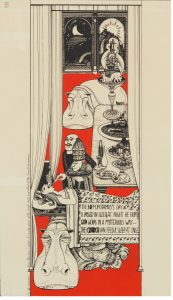 A unique set of illustrations to Eliot’s early poem, ‘The Hippopotamus’, by the Scottish polymath Alasdair Gray, is to be auctioned.
A unique set of illustrations to Eliot’s early poem, ‘The Hippopotamus’, by the Scottish polymath Alasdair Gray, is to be auctioned.
The lot description tells the story of these works. Commissioned in 1969-70, the patron requested a work which “explored the disconnect between the presentation and actions of the Church and their lack of alignment with the deeper teachings of Jesus. Alasdair Gray chose to use T.S. Eliot’s ‘The Hippopotamus’ as his subject.”
In a later interview, Gray said that when he subsequently sought to produce prints from these originals, “I was told that T.S. Eliot had explained that he did not ever want this poem illustrated, and so the copyright was not available.”
The originals, and their story, can be seen in full on the website of the Edinburgh auctioneers Lyon & Turnbull here. The works are to be auctioned on 14th January 2026, and have an estimate of £2000-£4000.
———————————————————————————————————-
Self-recognition in Four Quartets, December 2025
 “The closing lines of ‘Little Gidding’ have been read as spiritual allegory when they are in fact rigorous phenomenological description,” argues a new essay. “T. S. Eliot is not ‘symbolizing’ a journey toward divine grace. He is ‘documenting’ the structure of how consciousness recognizes itself after transformation.”
“The closing lines of ‘Little Gidding’ have been read as spiritual allegory when they are in fact rigorous phenomenological description,” argues a new essay. “T. S. Eliot is not ‘symbolizing’ a journey toward divine grace. He is ‘documenting’ the structure of how consciousness recognizes itself after transformation.”
‘Knowing the Place for the First Time: The Universal Pattern of Self-Recognition in T.S. Eliot’s Four Quartets’ is an essay by Sabrina Dawn Palmer, an independent researcher “developing mathematical and conceptual frameworks for understanding the dynamical structure of human cognition.”
The essay focusses upon lines in the final passage of ‘Little Gidding’:
We shall not cease from exploration
And the end of all our exploring
Will be to arrive where we started
And know the place for the first time
These lines, Palmer argues, “are universally read as a summary of the poem’s theological architecture. This paper argues they are doing something more precise: describing the phenomenological structure of self-knowledge.”
“The ‘place’ we return to is not heaven or the eternal present. It is the self—but the self known finally, clearly, because we have gained the distance necessary to see it. The exploration that ‘arrives where we started’ is inward excavation: the examined life discovering itself as the only life worth returning to.”
She argues that “Four Quartets stages this discovery across four movements, each enacting a distinct mode of interior work:
‘Burnt Norton’ expands possibility-consciousness
‘East Coker’ provides the method of suspension
‘The Dry Salvages’ reveals the transformation of the explorer
‘Little Gidding’ achieves recognition and integration.”
The essay is available on open access here.
———————————————————————————————————-
‘Graph theory’ and The Waste Land, December 2025
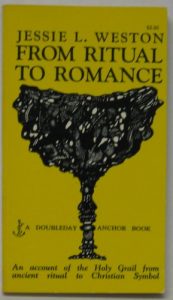 An essay by Ahaana Bhargava, of the Oberoi International School (OGC), Mumbai, is concerned with ‘Quantifying the Anthropological Core of T.S. Eliot’s The Waste Land Through Graph Theory’.
An essay by Ahaana Bhargava, of the Oberoi International School (OGC), Mumbai, is concerned with ‘Quantifying the Anthropological Core of T.S. Eliot’s The Waste Land Through Graph Theory’.
The essay employs graph theory to examine the “scaffolding” of the poem. “By constructing an intertextual network graph where nodes represent the poem’s sections and its cited source texts, this analysis applies the graph-theoretical metric of betweenness centrality to identify structural hubs.”
This approach confirms, Bhargava writes, “that the anthropological works of Jessie L. Weston (From Ritual to Romance) and James Frazer (The Golden Bough) function as the network’s critical core, possessing the highest betweenness centrality. This quantifies their role as not solely influences, but also as the essential connective tissue. It highlights that they are the conceptual bridges linking the poem’s disparate fragments of modernity, classicism, and spirituality.”
“By modeling the poem’s intertextual allusions as a network and applying the metric of betweenness centrality,” Bhargava argues, “we have moved the critical conversation from qualitative impression to quantitative fact.”
The essay is available on open access here.
———————————————————————————————————-
Old Possum’s “mewsings”, December 2025
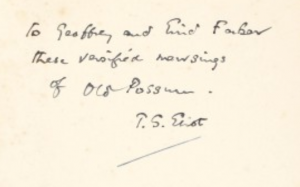 A unique association copy of the first illustrated edition of Old Possum’s Book of Practical Cats has come up for sale.
A unique association copy of the first illustrated edition of Old Possum’s Book of Practical Cats has come up for sale.
The book is incribed “To Geoffrey and Enid Faber these versified mewsings of Old Possum. T.S.Eliot”
Geoffrey Faber, founding partner of the publishers Faber & Gwyer which went on to become Faber & Faber, was Eliot’s employer, colleague and close friend; his son Tom was Eliot’s godson, and received whimsical letters from Eliot including an announcement that “All Pollicle Dogs & Jellicle Cats to come to the birthday of Thomas Faber”.
The book is being sold by Jonkers Rare Books for £15,000, and full details are here.
———————————————————————————————————-
“TS Eliot’s Hollow Men are all around us”, December 2025
 “‘The Hollow Men’ was published a century ago. How have these hundred or so lines, over the last hundred years, beguiled such a disparate array of minds? And for so long?”
“‘The Hollow Men’ was published a century ago. How have these hundred or so lines, over the last hundred years, beguiled such a disparate array of minds? And for so long?”
In an article in the New Statesman, Tanjil Rashid, the magazine’s culture editor, explores the history and contemporary significance of ‘The Hollow Men’. He explores the origins of its title, and its links to The Waste Landand to Eliot’s life and subsequent conversion. “’The Hollow Men’ proclaims the end of the world,” he writes, ‘not with a bang but a whimper’; what this perplexing assertion seems to have meant, then, is not so much the world’s slow descent towards Armageddon but the end of Eliot’s own individual, godless envisioning of the world.”
He concludes that “what his poem communicates today is radically different from what it meant to Eliot himself. In a post-religious world – shorn of biblical teaching – we do not see in ends beginnings, as Eliot so quotably did. We are blind to the rejuvenating possibilities of utopia on Earth or in Heaven. And instead of seeing in the poem’s landscape the desolation within the soul – whose existence we deny – we sense in it the destruction of our world.”
The full article is here.
The New Statesman has also republished from its archives the assessment of T.S. Eliot which the poet and critic I.A. Richards published in 1926, explaining “how T.S. Eliot’s ‘music of ideas’ saved a generation” – the article is here.
———————————————————————————————————-
Signed copy of The Waste Land received by Wolfson College, December 2025
 Wolfson College, Oxford has been donated a signed copy of T.S. Eliot’s The Waste Land.
Wolfson College, Oxford has been donated a signed copy of T.S. Eliot’s The Waste Land.
The College’s copy was generously donated by Dr Yosef Wosk, a Visiting Scholar at Wolfson’s Oxford Centre for Life-Writing. As a 1960 edition, it would seem to be one of the 300 limited edition Officina Bodoni copies, hand-printed in Verona under Giovanni Mardersteig and signed by Eliot.
“Wolfson is grateful to Dr Wosk for his generosity in augmenting its special book collections by donating this rare and special edition of Eliot’s work to the College.”
Full details of Dr Wosk and his donation are here.
———————————————————————————————————-
New volume of academic essays considering the later Eliot, November 2025
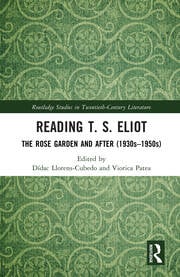 A collection of new academic essays, Reading T. S. Eliot: The Rose Garden and After (1930s–1950s), has been published by Routledge.
A collection of new academic essays, Reading T. S. Eliot: The Rose Garden and After (1930s–1950s), has been published by Routledge.
The editors, Viorica Patea, Professor of English Literature at the University of Salamanca, and Dídac Llorens-Cubedo, Associate Professor of English at the Universidad Nacional de Educación a Distancia (UNED, Spain), explain that “In ‘Burnt Norton,’ the poetic speaker enters a rose garden, a space of envisioned timeless illumination,. This experience sets in motion a spiritual quest, which will confer unity upon Four Quartets. For the poet himself, it inaugurates a creative phase (mid-1930s to late-1950s) that strengthens his sense of faith and community.”
The fourteen essays focus primarily on the dramas and social commentaries which Eliot produced in this period. “These aspects of Eliot’s career are influenced by concrete historical and biographical circumstances such as the impact of war and his ongoing relationship with Emily Hale”
The book is divided into three sections – ‘The Poet, the Rose Garden, and the Playhouse (1930s)’, with contributors including Barry Spurr and Sara Fitzgerald; ‘Full-Time Dramatist with a Vision (late 1930s-late 1950s)’, including an essay by Jewel Spears Brooker on The Family Reunion; and ‘Critic with a Wider Scope (1940s-1960s)’, considering Eliot’s writings on education, culture, politics, and as a “Christian thinker” on World War 2, and Post War Reconstruction.
Although the collection is at an academic pricepoint, there is a “Black Friday” launch discount until Tuesday 2nd December, and a cheaper eBook version. Full details of contents, contributors and ordering are here.
———————————————————————————————————-
‘The Hollow Men’ and “T.S. Eliot’s 20th Century Nightmare”, November 2025
 In an article in The Observer, Jude Rogers writes about ‘The Hollow Men’ and how, a century on from its first publication, “references to ‘The Hollow Men’ flood pop culture”.
In an article in The Observer, Jude Rogers writes about ‘The Hollow Men’ and how, a century on from its first publication, “references to ‘The Hollow Men’ flood pop culture”.
Rogers traces the “dark period in the poet’s life” from which the poem emerged. “Behind these words was a poet plagued by illness and depression,” she writes. She quotes Lyndall Gordon on Eliot’s “extreme state” at the time.
Eliot’s New York Timesobituary referred to The Hollow Men’s climax as “probably the most quoted lines of any 20th-century poet writing in English”. Rogers cites appearances of its final lines in poems, films, songs and even video games. Clare Reihill, trustee of the Eliot estate, describes one of the more unusual appearances of the poem, and presents a short letter to “Mrs TS Eliot” from Francis Ford Coppola, thanking her for permission to use the poem in Apocalypse Now.
“But, writes Rogers, “the compelling association of the atomic bomb to the world-ending bang or whimper of The Hollow Men was ‘irrelevant’, Eliot told New York writer Henry Hewes in a 1958 interview.”
The article is here.
———————————————————————————————————-
Edna O’Brien’s final work a biography of T.S. Eliot, November 2025
 An article in The Sunday Times reveals that when Edna O’Brien died, she was working on a biography of T.S. Eliot. The article is by Esme Lloyd, who worked as typist for O’Brien, who was too frail at the time to type herself and died aged 93 in July 2024.
An article in The Sunday Times reveals that when Edna O’Brien died, she was working on a biography of T.S. Eliot. The article is by Esme Lloyd, who worked as typist for O’Brien, who was too frail at the time to type herself and died aged 93 in July 2024.
It was while writing her 2020 lecture on Eliot, broadcast at the Abbey Theatre, Dublin, that O’Brien decided she wanted to expand her research into a book. “Edna spoke about him as if she had access to his most intimate thoughts,” writes Lloyd, “which perhaps she did: she was friends with the custodian of Eliot’s home and had personal entry to his flat in Kensington, which was closed to the public. She was free to browse his shelves or sit in his chairs whenever she chose.”
She says of O’Briens writing technique that “Sentences arrived fully formed, whole paragraphs running without pause. Eliot’s entire life was intact in her brain, and she conjured it up with all the richness of her fiction. Suddenly I was plunged into the minutiae of his relationships, his casual cruelties and desires, rendered with characteristic savage honesty.”
The book is to be published in summer 2027 as part of a collection of O’Brien’s non-fiction essays. Ecstasy, Uncertainty & Folly: Selected Non-Fiction, edited and selected by her son Carlo Gébler, alongside her editor, Lee Brackstone.
The article (£) is here.
———————————————————————————————————-
Inside the Little Gidding church, November 2025
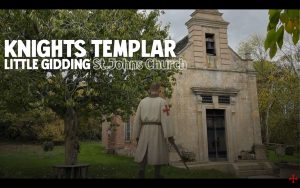 A short video produced by the Knights Templar enters St John’s Church at Little Gidding, tracing its history, and providing views around the interior of the place where, Eliot wrote, “prayer has been valid”.
A short video produced by the Knights Templar enters St John’s Church at Little Gidding, tracing its history, and providing views around the interior of the place where, Eliot wrote, “prayer has been valid”.
“From the embroidered words of T. S. Eliot that still hang within its church, to the medieval legacy of the Knights Templar, Little Gidding has always been a sanctuary. Discover how the Ferrar family of the 17th century, the Templars of the 12th century, and even the Knights Hospitaller preserved this sacred space through the centuries.”
Watch the video here.
———————————————————————————————————-
Video recording of Robert Crawford lecture available to members, November 2025
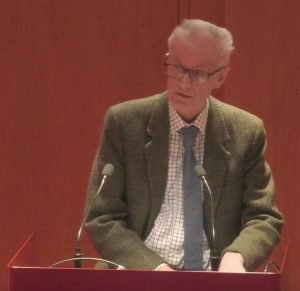 Exclusively for Society members, a video recording is now available online of the Annual TS Eliot Lecture 2025, given by Robert Crawford.
Exclusively for Society members, a video recording is now available online of the Annual TS Eliot Lecture 2025, given by Robert Crawford.
‘Tradition(s) and the Individual Talent’ was delivered at Newnham College, Cambridge, by Robert Crawford, author of the acclaimed two-volume biography of Eliot.
The recording can be viewed through the page of Society Recordings, in the Members Only area of this site.
———————————————————————————————————-
Richard Harries on tradition, Eliot and modern life, November 2025
 In Thought for the Day on BBC Radio 4, Richard Harries spoke of Eliot’s stance on tradition, and applied it to “the fashion of our times, the intellectual, spiritual and moral outlook which shapes our age”.
In Thought for the Day on BBC Radio 4, Richard Harries spoke of Eliot’s stance on tradition, and applied it to “the fashion of our times, the intellectual, spiritual and moral outlook which shapes our age”.
Lord Harries, pictured here delivering the Annual TS Eliot Lecture in 2024, sought to distinguish between “what is of lasting value and what will simply pass away as mistaken or trivial.”
He explained how “Eliot believed that we can only truly understand our own age if we are rooted in a tradition – otherwise you simply get carried along unaware that you are being carried.
“If you stand within a tradition however, you can see your age for what it is, what is truly new about it and what might be valuable.
“What Eliot said applies much more widely than to poetry; it’s true of our whole stance on life.”
Broadcast on 7th November, you can hear the two-minute item again for a limited time on BBC Sounds.
———————————————————————————————————-
International T. S. Eliot Student and Early-Career Researcher Writing Group, November 2025
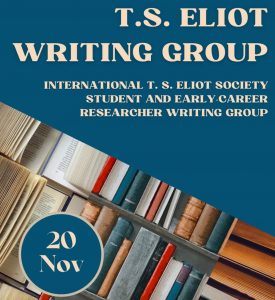 An international online writing group is being established, in which current students (undergrad/graduate/postgrad), early-career researchers, and those currently writing a chapter, article or conference paper about T. S. Eliot can meet to discuss their work.
An international online writing group is being established, in which current students (undergrad/graduate/postgrad), early-career researchers, and those currently writing a chapter, article or conference paper about T. S. Eliot can meet to discuss their work.
Organisers from the US-based International T.S. Eliot Society explain that “These sessions aim to provide a safe and friendly space where we can all set aside some time for work, whether it’s writing a section of your thesis or dissertation, reading an article, editing, or brainstorming ideas for a paper.
“There’s no need to read or share any writing—this is simply a place to work alongside fellow undergraduates, postgraduates, and early-career researchers in a supportive, structured, and focused environment.”
The group is being run by three European-based scholars; David Strong, a second-year PhD student at the University of East Anglia; Andrea Lupi, a third-year PhD student at the University of Pisa; and Natalia Roguz, a Master’s student pursuing an MLitt in Comparative Literature at the University of St Andrews.
The first session is on Thursday November 20th; full details, contacts and registration links are here.
———————————————————————————————————-
Autumn issue of Exchanges… published, November 2025
 The Autumn issue of our Society quarterly, Exchanges…, is now available for download.
The Autumn issue of our Society quarterly, Exchanges…, is now available for download.
Its contributions from members include two articles on ‘The Hollow Men’ celebrating the poem’s centenary; a report on a 400th anniversary celebration at Little Gidding; an article on the relevance of Eliot today; and a report on the Annual TS Eliot Lecture 2025 delivered by Robert Crawford.
You can download this new issue here.
———————————————————————————————————-
Eliot vs Murry, The Criterion vs The Adelphi, November 2025
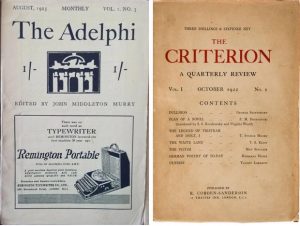 In The Review of English Studies, Zoe Rucker examines ‘Editorializing Englishness: T. S. Eliot, John Middleton Murry, and Interwar National Identity’
In The Review of English Studies, Zoe Rucker examines ‘Editorializing Englishness: T. S. Eliot, John Middleton Murry, and Interwar National Identity’
Rucker, of Balliol College, Oxford, revisits the Classicism-Romanticism debate between Eliot and Murry, conducted via their respective journals The Criterion and The Adelphi, and examines it “as a thinly veiled endeavour for each editor to stage their respective versions of English national identity in and through their exchanges.”
She argues that “Eliot emerged from the debate having self-fashioned the iconic Anglo-European persona represented under the ‘ideological coat of arms’ […] ‘classicist in literature, royalist in politics, and anglo-catholic in religion’. Each dimension of this identity was sculpted in the course of his dialogue with Murry.”
She questions whether their debate was ‘stage-managed’; considers how Eliot used an editorial imprimatur as a mode of self-fashioning; and how he and The Criterion subsequently related to the young writers of the 1930s who reacted against “the idea of Englishness which Eliot represented and had enshrined at the centre of the literary-cultural establishment”.
The essay can currently be read in full here.
———————————————————————————————————-
The Cocktail Party, inscribed to its first producer, October 2025
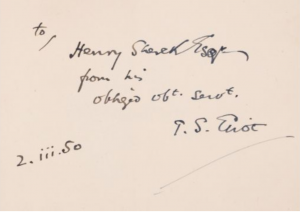 A copy of The Cocktail Party is being auctioned, inscribed “To Henry Sherek from his obliged obt. servt. T.S. Eliot.”
A copy of The Cocktail Party is being auctioned, inscribed “To Henry Sherek from his obliged obt. servt. T.S. Eliot.”
Henry Sherek produced several of Eliot’s plays, including the premiere of The Cocktail Party at the Edinburgh Festival in 1949. Eliot’s long-term director, E. Martin Browne, wrote that: “Henry Sherek’s shrewd theatrical judgment was of much value to Tom, who from then on came more and more to rehearsals and enjoyed the company of his actors. I feel that he was very fortunate – and so was I – to work with an individual manager, and such an individualist, with so personal a love for the theatre.”
This inscription, on a First Edition of The Cocktail Party, is dated “2.III.50”, a week before its publication on 9th March that year.
With an estimate of £750-£1000, the book is to be auctioned on 20th November by Forum Auctions – details are here.
———————————————————————————————————-
The Love Song of J. Alfred Incel, October 2025
 “Which literary figure most purely distills the qualities of the incel? Who puts you in the incel’s shoes, in the incel’s mind, and shows you just what it’s like to be one?”
“Which literary figure most purely distills the qualities of the incel? Who puts you in the incel’s shoes, in the incel’s mind, and shows you just what it’s like to be one?”
In an article on his Substack platform, The Muted Trumpet, Sam Buntz considers whether J. Alfred Prufrock is an example of the contemporary ‘incel’ (involuntary celibate).
“Prufrock cannot act,” he writes. “He is imprisoned in word and thought, unable to translate himself into the realm of the deed.
“The incel is the exact same way,” he argues. “But his imprisonment is more severe because he is terminally online. He lives in a world that is purely comprised of thought and word, in which action is effectively impossible, doomed to mire. Only simulated action exists as a possibility—unless he were boldly to slide into someone’s DMs. And even if he did, would he “after tea and cakes and ices, / Have the strength to force the moment to its crisis?”
“Prufrock,” Buntz concludes, “still walks these 21stCentury streets.” The full article is here.
———————————————————————————————————-
Eliot Studies Annual editorial position, October 2025
The T. S. Eliot Studies Annual is seeking a new editor.
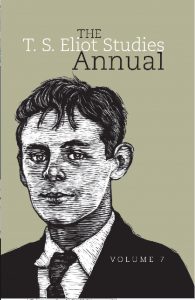 Now in its seventh volume, the Annual features the best new scholarship on T. S. Eliot, published once a year by the US-based International T. S. Eliot Society and Clemson University Press in association with Liverpool University Press. The Annual is available on JSTOR Books and University Scholarship Online, as well as Project Muse.
Now in its seventh volume, the Annual features the best new scholarship on T. S. Eliot, published once a year by the US-based International T. S. Eliot Society and Clemson University Press in association with Liverpool University Press. The Annual is available on JSTOR Books and University Scholarship Online, as well as Project Muse.
Its co-editors supervise each volume from the first call for papers through the referee and editorial process, production, and promotion/circulation.The new editor will join the existing team as associate editor for an initial term of six months starting January 1, 2026 and become a full-fledged co-editor with the publication of the current volume in July 2026. The position affords opportunities to develop the journal, impact Eliot scholarship, and build professional relationships. Editorial experience is not required, but a record of scholarly publication is necessary.
Details of application requirements, which must be submitted by Friday Nov 21st, are here.
———————————————————————————————————-
Professor Robert Crawford to deliver 2025 Annual T.S. Eliot Lecture, October 2025
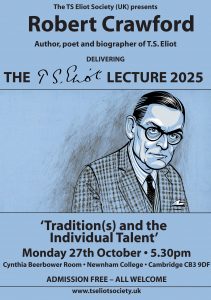 The Society is delighted to announce that the 2025 Annual T.S. Eliot Lecture will be delivered by Robert Crawford, author of the acclaimed two-volume biography. Young Eliot and Eliot After The Waste Land.
The Society is delighted to announce that the 2025 Annual T.S. Eliot Lecture will be delivered by Robert Crawford, author of the acclaimed two-volume biography. Young Eliot and Eliot After The Waste Land.
Professor Crawford’s lecture is titled ‘Tradition(s) and the Individual Talent’.
A poet, biographer, critic and literary historian, Robert Crawford is emeritus Professor of English at the University of St Andrews. His earlier book, The Savage and the City in the work of T.S. Eliot, examined Eliot’s twin concerns of primitive and metropolitan life, while his authoritative two-volume biography of Eliot was described as “compelling” and “magisterial”.
The Lecture will be delivered at Newnham College, Cambridge on Monday 27th October at 5:30pm. Admission is free and open to all, with entry on a first come, first served basis.
———————————————————————————————————-
Lyndall Gordon writes on the nature of biography and T.S. Eliot, October 2025
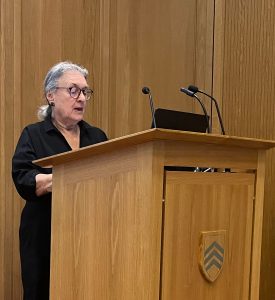
Annual T.S. Eliot Lecture 2023
In a revelatory essay in the Autumn 2025 issue of The Hudson Review, Lyndall Gordon writes about her career, and considers the nature of biography, with particular references to her works on TS Eliot and Emily Hale.
In ‘Lessons of the Masters’, Gordon describes her approach to her work. “How does a biographer word the elusiveness of Eliot and his flair for performance encased as these are in his search for meaning and faith?” she asks. “The biographer, alert to ambiguities, makes an effort to meet him honestly, knowing full well that nothing can match the poet’s timeless words.”
As she depicts her subject, she writes, “I think of a sculptor freeing that character from the dense wooden block of existing from day to day and hour to hour.” And she describes the issues which emerge along with that character. “Eliot’s alternation of devotion and retreat is disturbing to read,” she says. “It was an almost impossible challenge to be truthful about imperfections while keeping the all-time greatness in view. There were sleepless nights because it seemed wrong to join with those Eliot admirers who try to pat down the misogyny, the grossness of his obscene poems and the banality of his anti-Semitism in order to protect his reputation. I believe we have to acknowledge such elements in this man of extremes who shaped the poetry.”
Gordon writes about the revelations which emerged when Eliot’s letters to Emily Hale were finally released. “Eliot betrayed the devotion he asked from Emily Hale when, near the end of his life, he wrote a letter to posterity saying that she would have destroyed him as a poet.” She believes “The opposite was the case: as ‘the hyacinth girl’ in The Waste Landand as the Lady in Ash Wednesday, she elevated his imagination as Beatrice did for Dante.”
Lyndall Gordon’s fascinating essay can be read in full here.
The same issue of The Hudson Review also contains a review by Michael Thurston of The Collected Prose of T.S. Eliot.
———————————————————————————————————-
T.S. Eliot responds to questions about ‘The Waste Land’, October 2025
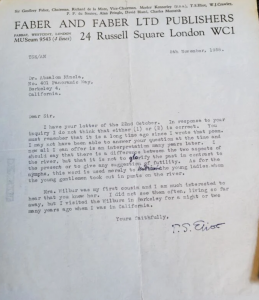 A 1958 letter in which Eliot replies to two queries about his poetry has been shown at a book fair in Los Angeles.
A 1958 letter in which Eliot replies to two queries about his poetry has been shown at a book fair in Los Angeles.
Frustratingly, the questions which were asked of Eliot are not clear, but they appear to relate to The Waste Land. In response to the first, Eliot writes that “there is a difference between the two aspects of the river, but that it is not to glorify the past in contrast to the present or to give any suggestion of futility.”
To the second question, Eliot replies, with a handwritten correction, “As for the nymphs, this word is used merely to define indicate the young ladies whom the young gentlemen took out in punts on the river.”
The letter is included in a folder of replies received from Agatha Christie, Dwight Eisenhower and others, to queries sent ostensibly from Dr Absalom Minola, actually the name of a US prankster’s cat. Exhibited at the bookseller’s fair Rare Books LA, an image and details as reported by the LA Times are here.
———————————————————————————————————-
Was Bob Dylan inspired by a T.S. Eliot interview?, October 2025
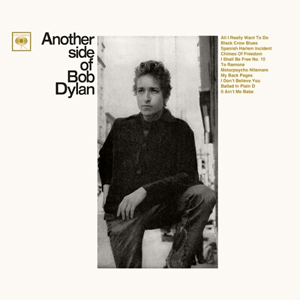 An article in the Ad Fontes journal examines some of the connections between T.S. Eliot and Bob Dylan.
An article in the Ad Fontes journal examines some of the connections between T.S. Eliot and Bob Dylan.
In “Mature Poets Steal”?: Dylan and Eliot, E.J. Hutchinson, Associate Professor of Classics at Hillsdale College, asks in particular whether Dylan’s line in‘My Back Pages‘, “Ah, but I was so much older then / I’m younger than that now” may have been inspired by remarks made by Eliot during an interview published in the US in 1958.
The article highlights references which Dylan has made to Eliot – although the author fails to attribute lines from The Family Reunion– “In a world of fugitives / The person taking the opposite direction / Will appear to run away.” – to which Dylan refers at one point.
“Even without the biographical details,” Hutchinson concludes, “the verbal parallel noted at the outset is suggestive of allusion to Eliot’s words, and with the biographical details there are plausible paths to reconstruct how Dylan might have come across them. Furthermore, they are thematically similar enough to the repeated lines in “My Back Pages” to warrant reflection.”
The article is here.
UPDATE: The article has now been updated to incorporate the attribution to The Family Reunion.
———————————————————————————————————-
Complete set of The Criterion for sale, September 2025
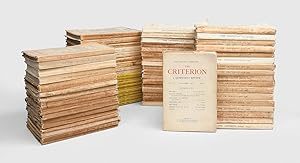 A rare set of every issue of The Criterion, edited by T.S. Eliot, has come up for sale.
A rare set of every issue of The Criterion, edited by T.S. Eliot, has come up for sale.
These First Editions of the complete run of The Criterion consist of 71 issues in 18 volumes, and include the first volume with the first appearance in print of ‘The Waste Land’. It also contains at least 119 contributions by Eliot himself, including early versions of Eliot’s ‘The Hollow Men’ and ‘Ash Wednesday’, and many other unattributed commentaries and pieces.
Edited by Eliot, The Criterion was taken over by Faber in January 1926, when it was retitled The New Criterion and later The Monthly Criterion. Publication ceased at the beginning of the war.
The complete set is offered by the booksellers Peter Harrington for £25,000. They also have for sale a single standalone copy of the first issue, containing ‘The Waste Land’, for £6,750.
———————————————————————————————————-
Richard Harries reviews the latest Letters, September 2025
Richard Harries has reviewed the recent Volume 10 of The Letters of T.S. Eliot in Church Times.
Scroll down to the news of publication in July, where a link has been added to the book’s reviews.
———————————————————————————————————-
Membership of the Society is now open for 2025/26, September 2025
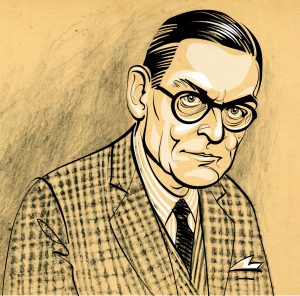 We are delighted to invite you to join the TS Eliot Society (UK) for the coming year.
We are delighted to invite you to join the TS Eliot Society (UK) for the coming year.
Our membership year runs from September to September, and by subscribing now you can join and enjoy a full year of Society benefits. These include:
- A monthly e-mail Update on news about Eliot, events, and resources added to the websit.e
- Booking privileges for the Annual T.S. Eliot Lecture, to be given this year by Eliot’s biographer Robert Crawford, and for the annual T.S. Eliot Festival at Little Gidding.
- The opportunity to contribute to our quarterly publication, Exchanges, and a free print copy of our annual academic Journal.
- Access to the Members Only area of our website, containing recordings of our lectures and readings, sales of rare and out-of-print Eliot books, and requests from members for assistance with Eliot projects.
For details of the full range of membership benefits, do visit our Membership page via the menu above.
A full year’s membership to the Society costs just £15 (£6 for full-time students), and you can join via the Membership page. We do hope you will join us!
———————————————————————————————————-
Auction of inscribed and signed Eliot items, September 2025
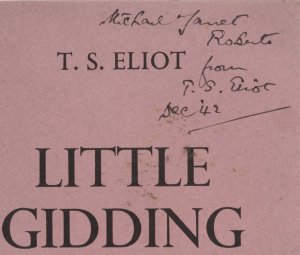 Inscribed items from the collection of Michael Roberts and Janet Adam Smith and their descendants are to be sold at auction.
Inscribed items from the collection of Michael Roberts and Janet Adam Smith and their descendants are to be sold at auction.
Michael Roberts was a poet, writer, mathematician, critic and broadcaster, who became a valued colleague of Eliot, editing anthologies such as The Faber Book of Modern Verse. Janet Adam Smith was a writer, literary editor and journalist, and was assistant editor at The Listener, where she did much to promote the work of new poets, when she married Michael Roberts in 1935. In 1936 she succeeded Michael Roberts as chief reviewer in The Criterion. Their son Adam was one of Eliot’s godchildren.
Their collection includes inscribed copies of Little Gidding, The Classics and the Man of Letters, The Music of Poetry and What is a Classic?, as well as letters, signed Christmas cards, and copies of the New English Weekly’s supplementary copies of ‘East Coker’.
UPDATE: The results of the auction, with images of the items, are here.
———————————————————————————————————-
Four Quartets one of the “best ever” episodes of In Our Time, September 2025
 Many articles mourn the departure of Melvyn Bragg from BBC Radio 4’s In Our Time. In The Times, Ben Dowell, who has listened to every episode, lists the best 15, which include the 2016 episode on T.S. Eliot’s Four Quartets.
Many articles mourn the departure of Melvyn Bragg from BBC Radio 4’s In Our Time. In The Times, Ben Dowell, who has listened to every episode, lists the best 15, which include the 2016 episode on T.S. Eliot’s Four Quartets.
“This might be the best ever,” writes Dowell. The episode was first broadcast in 2016, and features David Moody, Fran Brearton and Mark Ford in discussion with Bragg. “Even if you know TS Eliot’s last great work,” he writes, “the close textual analysis here illuminates it more deeply, especially when Professor David Moody gets going.”
His article in The Times is here (£), while the whole episode is free to access on BBC Sounds here.
———————————————————————————————————-
“With the affectionate regards of T.S. Eliot”, September 2025
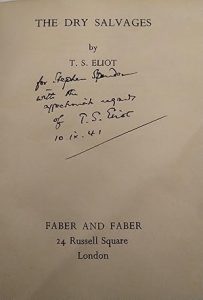 A number of books inscribed by T.S. Eliot to friends, relatives and colleagues are being sold by the bookseller Peter Grogan.
A number of books inscribed by T.S. Eliot to friends, relatives and colleagues are being sold by the bookseller Peter Grogan.
Perhaps the most collectible is a copy of The Dry Salvages, inscribed “for Stephen Spender with the affectionate regards of T.S. Eliot 10.ix.41.” “The warmth of the inscription, by Eliot’s standards,” writes Grogan, “reflects his long friendship with Spender.”
There are half a dozen books inscribed by Eliot to Mary Hutchinson, a prominent Bloomsbury hostess who became friends with T.S. and Vivienne Eliot when they took a cottage at Bosham, on Chichester Harbour, in Sussex, not far from the Hutchinsons at Wittering. In addition is a copy of Sweeney Agonistes inscribed to her from Vivienne.
Other inscriptions from Eliot are to his sister Margaret, his neice Theodora, his secretary and later poet Anne Ridler, and his theatrical colleague E. Martin Browne, among others.
The full selection of 18 titles can be seen here.
———————————————————————————————————-
T.S. Eliot: “Three viands which I have consistently to decline”, August 2025
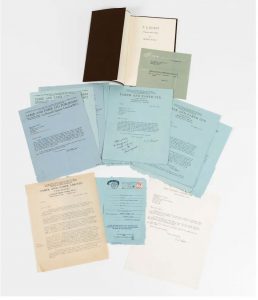 A dealer in the US is selling a series of 15 typed and signed letters from T.S. Eliot to Henry Rago, the Editor of Poetry magazine. The letters, which span the dates 7 January 1957 through 23 October 1959, primarily concern Rago’s invitation to Eliot to read and speak at an annual Poetry Day event in Chicago.
A dealer in the US is selling a series of 15 typed and signed letters from T.S. Eliot to Henry Rago, the Editor of Poetry magazine. The letters, which span the dates 7 January 1957 through 23 October 1959, primarily concern Rago’s invitation to Eliot to read and speak at an annual Poetry Day event in Chicago.
There are several interesting passages quoted from the letters. In one, Eliot discusses refreshments for himself and Valerie: “You emphasise the lavish provision of champagne at the banquet. Neither my wife nor I can take champage [sic], she not at all and I only very little! I therefore hope that there will be some other beverage — preferably still wine — available for us two unfortunates. Champagne, strawberries and tripe are three viands which I have consistently to decline.”
In another, he agrees to a recording of his reading: “Tape recordings have been made before and my only objection is that my impromptu remarks sound so flat and so halting that it is embarrassing for me to hear a play-back myself.”
The letters are being offered by Charles Agvent for $20,000, and details are here.
———————————————————————————————————-
Eliot, Philomel, Ovid and Shakespeare, August 2025
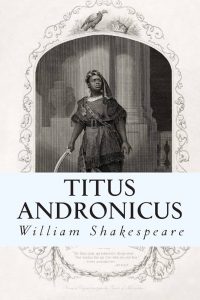 In Ad Fontes, “A Journal of Protestant Letters”, E.J. Hutchinson examines the reference in The Waste Land to the story of Philomel. The reference is linked in Eliot’s ‘Notes’ to Ovid’s Metamorphoses.
In Ad Fontes, “A Journal of Protestant Letters”, E.J. Hutchinson examines the reference in The Waste Land to the story of Philomel. The reference is linked in Eliot’s ‘Notes’ to Ovid’s Metamorphoses.
“What Eliot also doesn’t tell us in his notes,” writes Hutchinson, “is that he is not, or at least not only, thinking of Ovid directly, but of Ovid through the lens of Titus Andronicus.”
This is particularly remarkable, he observes, given that elsewhere Eliot describes Shakespeare’s play as “one of the stupidest and most uninspired plays ever written”.
Hutchinson explains the link, and considers whether Eliot used his ‘Notes’ to “obscure his creative use of a play he says he did not like.” The article can be read here.
———————————————————————————————————-
The story of The Waste Land‘s First Edition, August 2025
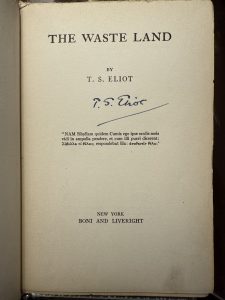 The US Library of Congress in Washington DC has published online an article with images on The First Edition(s) of T.S. Eliot’s “The Waste Land”. The article is by Patrick Hastings, the Education Outreach Specialist for their Rare Book and Special Collections Division
The US Library of Congress in Washington DC has published online an article with images on The First Edition(s) of T.S. Eliot’s “The Waste Land”. The article is by Patrick Hastings, the Education Outreach Specialist for their Rare Book and Special Collections Division
The article traces the financial and publishing negotiations which led to the poem’s first publication in book form by Boni & Liveright in the US. It also details how “Boni and Liveright’s marketing and packaging of the book leveraged the positive critical reception from the poem’s previous publications in The Criterion and The Dial earlier that fall.”
With accompanying details of the book and its original dustjacket, the article is here.
———————————————————————————————————-
A missing copy of The Waste Land, August 2025
 On the BBC Today programme, in an item about treasured books, Society member Di Beddow talked about her missing copy of The Waste Land.
On the BBC Today programme, in an item about treasured books, Society member Di Beddow talked about her missing copy of The Waste Land.
Di talked to Nick Robinson about how the book, a copy of the facsimile and transcript edition, bore an inscription from her father, He had always believed that education would be her ruination but, nevertheless, joined her mother in gifting her this book. Years later Di lent the book to a trainee teacher in Cambridge – and never saw it again.
For several years, Di has used the ‘My Favourite Eliot’ slot at the T.S. Eliot Festival at Little Gidding to ask Eliot enthusiasts to look out for her copy, in the original white cover, with its inscription to Di from Mum & Dad. She told the moving story in a short interview which you can hear at 2:23:30 here – and she has written more about her story in a brief article here.
If anyone does spot the book, or have any idea of its whereabouts, the Society will be happy to pass messages on to Di.
———————————————————————————————————-
Valerie’s Bequest of T.S. Eliot in translation, August 2025
Accompanying ‘A Dispatch from the Valerie Eliot Bequest’ 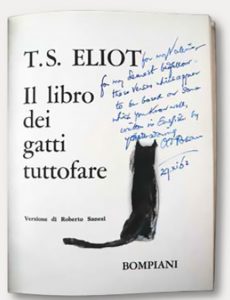 is this image of an Italian translation of Old Possum’s Book of Practical Cats. It is inscribed by Eliot “for my Valerie, for my dearest bedfellow: these verses appear to be based on some which you know well, written in English by your adoring Old Possum”, and dated “29 xi 62”.
is this image of an Italian translation of Old Possum’s Book of Practical Cats. It is inscribed by Eliot “for my Valerie, for my dearest bedfellow: these verses appear to be based on some which you know well, written in English by your adoring Old Possum”, and dated “29 xi 62”.
In a short accompanying article Dr Michelle Taylor, the inaugural Armstrong T. S. Eliot Research Fellow at Magdalene College, Cambridge, discusses her researches among more than 200 translations of Eliot’s work bequeathed to the College by Valerie Eliot. Her work “examines both T. S. Eliot’s philosophy of translation and his history of being translated – often, I am finding, in service of some kind of cultural diplomacy.
“Eliot is a good figure with whom to think about translation, and by extension the twentieth-century construction of ‘world literature’, not only because of his dialectical way of acting and thinking (about translation and about everything else), and not only because his work underwent so much translation both in his lifetime and after, but also because he is at the same time a polyglot and a philosopher-errant (the best kind).”
The article can be read here.
———————————————————————————————————-
The Letters of T.S. Eliot Volume 10 published this week, July 2025
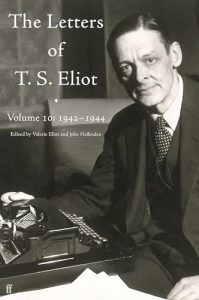 The latest volume of T.S. Eliot’s Letters, covering the years 1942-1944, is to be published this week.
The latest volume of T.S. Eliot’s Letters, covering the years 1942-1944, is to be published this week.
Edited as ever by the indefatigable Professor John Haffenden, the volume covers a fascinating period. At the height of WWII, Eliot leads a peripatetic life between London and the country, touring, speaking and writing when he can to sustain the cultural values of Europe, and surviving bombing raids upon London. “I have taken…,” he writes,”to sleeping in my teeth.” The letters to John Hayward in particular are, as Professor Haffenden writes, “a tour de force of the art: full of news, mischief and merriment”.
Creatively, this was the period in which Eliot wrote ‘Little Gidding’, and the volume contains the exchanges with Hayward in which the poem was considered and amended. Extracts appeared in Helen Gardner’s The Composition of Four Quartets, but the letters appear here in full, with many further revelations of Eliot’s thinking and changes to his initial drafts. “You did not point out to me,” remarks Eliot, just before publication, “…that I did not know how to spell ‘pigsty’. However, I will forgive you that, in view of your innumerable and much more important benefactions.”
The letters contain many observations upon other works as well. “I must explain,” he writes to one correspondent, “that if you have identified two persons alluded to in Animula you have preceded me in so doing because in neither line did I have any particular person in mind.”
The book is due to be published on Thursday 31st July; reviews will be summarised and linked to below as they appear.
The Letters of T.S. Eliot Volume 10: 1942-1944, edited by Valerie Eliot and John Haffenden, is published on 31st July, ISBN: 978-0-571-39649-8
Craig Raine, The Spectator: “These letters, with their rich annotation and the intimate correspondence with Emily Hale, are the real biography of Eliot…The life of the life is here – in its dullness, in its detail, in its attention to the very texture of Eliot’s existence.”
Richard Harries – Church Times: “These letters show him as deeply caring about a range of individuals… One visitor to Eliot wrote: ‘I had not thought I would find him so gentle, so considerate, so kindly.’”
———————————————————————————————————-
Summer 2025 issue of Exchanges… published, July 2025
The Summer issue of our Society quarterly,  Exchanges…, is now available for download.
Exchanges…, is now available for download.
Its contributions from members include reports from an event celebrating the centenary of Eliot joining Faber & Gwyer, and from the 2025 T.S. Eliot Festival at Little Gidding. There’s a personal account of rediscovering Eliot, and the unlikely story of how the rock n’roll singer P.J. Proby recorded The Waste Land.
You can download this new issue here.
———————————————————————————————————-
The 2025 Journal of the TS Eliot Society published, July 2025
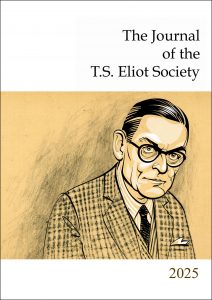 The 2025 edition of The Journal of the TS Eliot Society (UK) has now been published.
The 2025 edition of The Journal of the TS Eliot Society (UK) has now been published.
The new edition contains academic essays, notes and reviews on subjects ranging from Eliot’s essay on ‘Hamlet and His Problems’; the staging of Eliot-related events; the transmedia influences of Wyndham Lewis and R.B. Kitaj on Eliot’s legacy; Vivien Eliot, The Criterion and Autobiografiction; life in the metaxy: Voegelin, Eliot, and Four Quartets; and a note on a phrase at the end of Four Quartets.
The Journal of the T.S. Eliot Society (UK) is a peer-reviewed journal that annually publishes scholarly essays by leading as well as early career academics. The Journal is published open access digitally, with a printed version also available.
Full details, contents, an open access download link and print version details are all on the Journal page of this website.
———————————————————————————————————-
T.S. Eliot in Ireland, July 2025
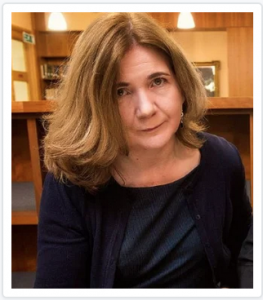 A recording has been made available of the Memorial Lecture given by Fran Brearton, Professor of Modern Poetry at Queen’s University Belfast, as part of the Annual Meeting of the International T.S. Eliot Society in Dubln.
A recording has been made available of the Memorial Lecture given by Fran Brearton, Professor of Modern Poetry at Queen’s University Belfast, as part of the Annual Meeting of the International T.S. Eliot Society in Dubln.
The title of her lecture is Barbarous Cuisine: T. S. Eliot in Ireland (1936 & 1940).
Fran Brearton’s books include The Great War in Irish Poetry, Reading Michael Longley, and, as editor, The Oxford Handbook of Modern Irish Poetry and Incorrigibly Plural: Louis MacNeice and his Legacy.She is a former president of the Robert Graves Society and appears regularly on BBC R4’s ‘In Our Time’ to discuss modern poetry. She was elected to the Royal Irish Academy in 2018.
The recording is available here.
———————————————————————————————————-
T.S. Eliot remembered, July 2025
 A short recollection of T.S. Eliot by the late science fiction writer Brian Aldiss has been published on his official website, in the centenary year of his birth.
A short recollection of T.S. Eliot by the late science fiction writer Brian Aldiss has been published on his official website, in the centenary year of his birth.
“No, no, I was never a friend of Eliot’s,” he wrote. “But I was being published by Faber & Faber when they lived grandly in a corner of Russell Square.
“My goodness! Eliot was at that time the very captain – the admiral – of all cultural fleets, in British waters and far beyond. You might say, wherever roars life’s boundless ocean.”
Aldiss was eventually “induced to go upstairs and talk to Eliot.” But, he recalled, “Talking with him was rather like enduring a church service.”
The short item can be read in full here.
———————————————————————————————————-
The 2025 Annual T.S. Festival at Little Gidding – tickets on sale, May 2025
 Tickets for the 2025 Annual T.S. Eliot Festival, to be held on Sunday 6th July at Little Gidding, are now on sale.
Tickets for the 2025 Annual T.S. Eliot Festival, to be held on Sunday 6th July at Little Gidding, are now on sale.
This year’s lineup includes Eliot scholar Sarah Kennedy; Editor of the ten-volume The Letters of T.S. Eliot John Haffenden; prize-winning poet George Szirtes; actress Katherine Waterston; and former Old Bailey judge Charles Wide.
Tickets are now available to the public, and a special discount on tickets for the Festival remains available to Society members. Full details of the line-up, and a link for booking, are on our Events page.
———————————————————————————————————-
“The title ARA VUS PREC would do…”, July 2025
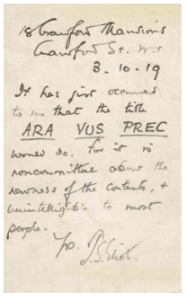 A group of interesting Eliot items which have come up for sale include this postcard, from Eliot to his then publisher John Rodker, proposing the title Ara Vus Prec for his 1920 collection of poems published by the Ovid Press.
A group of interesting Eliot items which have come up for sale include this postcard, from Eliot to his then publisher John Rodker, proposing the title Ara Vus Prec for his 1920 collection of poems published by the Ovid Press.
“It has just occurred to me,” writes Eliot, “that the title ARA VUS PREC would do, for it is noncommittal about the newness of the contents, & unintelligible to most people.”
It was only later, after the pages had been printed, that Eliot realised the translation error in his title, which should have been Ara Vos Prec.
The copy of the book with which the postcard is being sold was owned by Wyndham Lewis, and bears his bold ownership signature; together they are priced at £29,500.
Several other Eliot items are also being sold by Peter Grogan, including letters, proof copies and signed books. To view details and images, visit the Google Docs page here , on which click ‘⋮‘ then ‘download’ to view a PDF.
———————————————————————————————————-
Hear ‘The Love Song of J. Alfred Prufrock’ 110 years after first publication, June 2025
 To mark 110 years since ‘The Love Song of J. Alfred Prufrock’ was first published, in the June 1915 edition of Poetry magazine, the T.S. Eliot Foundation have released a reading of the poem by the actor Freddie Fox.
To mark 110 years since ‘The Love Song of J. Alfred Prufrock’ was first published, in the June 1915 edition of Poetry magazine, the T.S. Eliot Foundation have released a reading of the poem by the actor Freddie Fox.
Having memorised the poem for the reading, Fox chats with James Lever of Dead Poets Live about learning poetry by heart. and about ‘Prufrock’. “He also reads two other early poems of Eliot’s which have a bearing on Prufrock, and two poems by the young Eliot’s greatest poetical influence, Jules Laforgue.”
You can listen to the recording here.
———————————————————————————————————-
Rare and inscribed Eliot items up for sale, June 2025
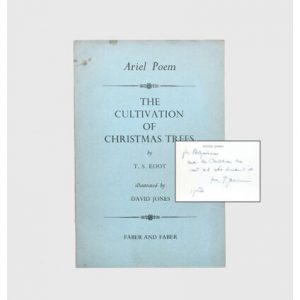 A clutch of rare T.S. Eliot items have been put up for sale by the London dealer Peter Harrington.
A clutch of rare T.S. Eliot items have been put up for sale by the London dealer Peter Harrington.
A First Edition copy of The Cultivation of Christmas Trees is inscribed “For Pollyma’am, and her Christmas tree and all who surround it, from T. Possum, 1954”. The recipient was Doris “Polly” Tandy, with whom Eliot often stayed, and whose daughter Alison was one of the dedicatees of Old Possum’s Book of Practical Cats.
A First Edition of The Elder Statesman is 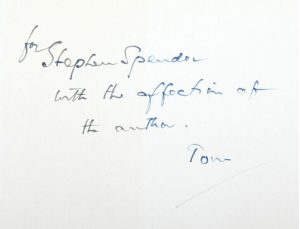 inscribed by Eliot “For Stephen Spender, with the affection of the author. Tom”.
inscribed by Eliot “For Stephen Spender, with the affection of the author. Tom”.
There is a copy of the June 1915 Poetry magazine, containing the first ever appearance of ‘The Love Song of J. Alfred Prufrock; a First Edition copy of Ash Wednesday, inscribed to the German philologist and literary scholar Robert Curtius; and a set of the infamous Prokosch ‘Butterfly Books’, featured in last Autumn’s issue of Exchanges, containing a verse from ‘Burnt Norton’; along with several signed limited editions of Eliot books.
Details and images of all the books are here.
———————————————————————————————————-
Light-hearted BBC literary quiz featuring Eliot’s poetry to be broadcast again, June 2025
 BBC Radio 4 Extra are to broadcast again an episode of a literary quiz from 1998 when its author of the week was T.S. Eliot.
BBC Radio 4 Extra are to broadcast again an episode of a literary quiz from 1998 when its author of the week was T.S. Eliot.
The Write Stuff was a light-hearted literary quiz, chaired by James Walton, and originally broadcast on BBC Radio 4. Each programme begins with the panellists reading favourite extracts from the author’s writing, and the first round is a series of quick-fire questions about the author’s life and works.
This episode ends with the panellists each attempting to turn one of Eliot’s poems into a limerick.
First broadcast in August 1998, the T.S. Eliot episode features Sebastian Faulks, John Walsh, Kate Saunders and Nigel Williams. It will be broadcast on BBC Radio 4 Extra on Thursday 17th July at 2pm, and full details are here.
———————————————————————————————————-
Letterpress printing of the Signet version of ‘Journey of the Magi’ up for auction, June 2025
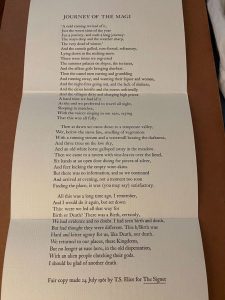 An unusual variant printing of ‘Journey of the Magi’ has come up for auction online.
An unusual variant printing of ‘Journey of the Magi’ has come up for auction online.
The letterpress printing (right, click to enlarge) reproduces a ‘fair copy’ of the poem which Eliot made for The Signet, Harvard’s literary society. Originally on three pages of Faber & Faber notepaper, Eliot made a manuscript copy of the poem for the society in 1961.
His copy contains several variants to the published poem. In particular, the line “Set down this” is not repeated. Altogether, there are seven variations, recorded in The Poems Vol II p433/4.
This letterpress printing of the Signet version was made by Firefly in 1961, and is “folded in thirds out to 12 by 5 inches.” The auction ends on 5th July; the reserve price is $99, and details and bidding are here.
———————————————————————————————————-
Prufrock and gendered discourse, June 2025
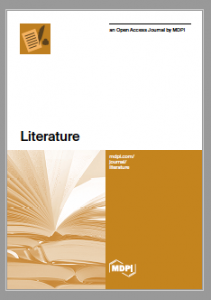 “Prufrock’s alienation is not solely a condition of modernity; it is a condition of being male in a society where emotional authenticity is subordinated to performative control.”
“Prufrock’s alienation is not solely a condition of modernity; it is a condition of being male in a society where emotional authenticity is subordinated to performative control.”
“That Is Not It at All; That Is Not What I Meant, at All”: Gender and Communication in T. S. Eliot’s The Love Song of J. Alfred Prufrock is an open access essay by Jill Channing, of East Tennessee State University, In it she argues that “Eliot critiques patriarchal norms by portraying Prufrock’s paralysis as a product of masculine performance anxiety—his fear of miscommunication, emasculation, and judgment in interactions with women.
“By positioning Prufrock as a man silenced by the demands of masculine performance—by the need to appear composed, authoritative, and emotionally impenetrable—Eliot exposes how modernist alienation is not merely the product of metaphysical disillusionment but is also a distinctly gendered phenomenon.”
The essay can be read in the Literature journal published by MDPI here.
———————————————————————————————————-
T.S. Eliot Studies Annual Vol 7 published, June 2025
 The 2025 T.S. Eliot Studies Annual has been published online.
The 2025 T.S. Eliot Studies Annual has been published online.
This seventh volume of academic essays includes contributions from Eliot scholars including Ron Schuchard, Timothy Materer, John D Morgenstern and John Whittier-Ferguson.
There is a Special Forum containing six essays considering ‘The Eliot We Need’, “arranged around the pursuit of new ways in which Eliot can help us to understand ourselves”. It is edited by Patrick Query, author of the recent book Freedom Is Not Enough: T. S. Eliot for Liberation, Resistance, and Hope.
There is free access to the full contents page and to the essay ‘Ecology and Voice: Non-Human Speech and Songs of the Earth in T. S. Eliot’s The Waste Land’ by Gabrielle McIntire; other content requires academic access. The Annual can be accessed here.
———————————————————————————————————-
Who was the ‘young man carbuncular’?, June 2025
 In an article drawn from research for his book, Satiric Modernism, recently out in paperback, Kevin Rulo investigates the “small house agent’s clerk” of The Waste Land.
In an article drawn from research for his book, Satiric Modernism, recently out in paperback, Kevin Rulo investigates the “small house agent’s clerk” of The Waste Land.
“While the descriptor ‘clerk’ has received some attention,” he writes, “what about the particularities of being a clerk for a ‘small house agent’? What might that signify?”
“Although a clerk, it is likely that the young man in The Waste Land, working in a smaller house agency, would be tasked with more than just clerical work. This likelihood is supported by Eliot’s drafts, which describe him as one ‘who flits / Daily, from flat to flat’. Rulo uses a description from Kipps, the novel by H.G. Wells, to picture the house and estate agents of the early twentieth century.
“Eliot’s use of the profession of the young man, similar to his use of the typist’s, is not haphazard but lends ever more potent meaning to the scene, which is one of avaricious exploitation and transaction of life into an art of the deal—a raw deal at that.”
The article is being published by the US-based International T.S. Eliot Society, in a new feature of their newsletter, Time Present, showcasing “recent monographs and edited collections published by Society members through the framework of a single archival record, photograph, newspaper clipping, or other document discovered while researching the book.” The article can be read here.
———————————————————————————————————-
Did T.S. Eliot send ‘coded messages’ to Muriel Spark?, June 2025
 A new biography of the early years of the author Muriel Spark details her obsession with T.S. Eliot, and her belief that he was sending her “coded messages”.
A new biography of the early years of the author Muriel Spark details her obsession with T.S. Eliot, and her belief that he was sending her “coded messages”.
Frances Wilson explains how Spark believed, for example, that messages to her were written into The Confidential Clerk, Eliot’s play which contains a character called Muriel. When a character pointed at a typewriter, Spark believed, audiences “did not understand that ‘typewriter’ means ‘muffled orator’, ‘outraged publisher’ and, ultimately, Eliot himself, the ‘writer of types’”. She found messages from Eliot in the play’s programme notes, and “Further messages were secreted to her…in the blurbs he wrote for Faber.”
At one time, “she began to hate and fear Eliot, whom she believed to be in league with the devil.” She thought “Eliot had broken into her flat to steal her food”, and she warned her friends Neville and June Braybrooke that “Eliot was posing as their window cleaner…so as to pry into their papers”.
It was not possible, Spark declared, that she was “in love with Eliot”, because she had never met him. Rather, she imagined Eliot to be in love with her – “it was he, after all, who was sending her messages.”
Electric Spark: The Enigma of Muriel Spark by Frances Wilson is published by Bloomsbury.
———————————————————————————————————-
Studies in Charles Williams, June 2025
 A new book by Stephen Barber investigates Charles Williams, of whom T.S. Eliot wrote “He seemed to me to approximate, more nearly than any man I have known familiarly, to the saint.”
A new book by Stephen Barber investigates Charles Williams, of whom T.S. Eliot wrote “He seemed to me to approximate, more nearly than any man I have known familiarly, to the saint.”
In Church Times, Richard Harries reviews Patterns of Glory: Studies in Charles Williams (Apocryphile Press). “In the first chapter,” Harries writes, “[Barber] explores the relationship between [Williams] and Eliot, arguing that, while Eliot was a significant early influence on Williams, by the end of his life he had been a no less spiritual influence on Eliot.”
The review of the book is here.
———————————————————————————————————-
Unpublished letters from Virginia Woolf to T.S. Eliot, June 2025
 A new volume of letters by Virginia Woolf contains fifty previously unpublished letters to T.S. Eliot.
A new volume of letters by Virginia Woolf contains fifty previously unpublished letters to T.S. Eliot.
A revew of The Uncollected Letters of Virginia Woolf (Edinburgh University Press) in the Literary Review explains that the letters in this volume were missing from the six-volume collected letters of Woolf “because the editors of those volumes weren’t aware of their existence, discovered them too late or thought them uninteresting.” Many, it seems, are simply invitations or arrangements for tea.
However, one of the letters to Eliot attempts to place a contribution in The Criterion:
Dear Tom,
I should like to write a story called,
‘Mrs. Dalloway in Bond Street’
(the title, I suppose, could be changed if necessary.)
“The title was not changed,” writes Zoe Guttenplan, “and The Criterion never took it.”
Her review is here.
———————————————————————————————————-
‘The Christian Criticism of T.S. Eliot’, May 2025
An essay in The Catholic World Report considers  ‘The Christian Criticism of T.S. Eliot’.
‘The Christian Criticism of T.S. Eliot’.
In a lengthy essay, referencing Newman, Yeats, Arnold, Lewis and others, Edward Short, author of several books on Newman, considers The Complete Prose of T.S. Eliot. He argues that “in any genuinely Christian culture, the essays would continue to command an honored place, even though Eliot’s own understanding of that culture could never be altogether reliable.”
That unreliability stems, he believes, from Eliot’s Anglo-Catholicism. “If we accept that ‘the culture of a people is an incarnation of its religion,’ as Eliot argued in Notes Towards the Definition of Culture, we have to recognize that Eliot’s own conversion – a conversion from unbelief to Anglo-Catholicism – would never be enough to help him bring about the cultural revival for which he yearned.
“There are more grounds than ever for agreeing with the poet that ‘If Christianity goes, the whole of our culture goes,’” he writes. “We must simply keep in mind that how we define Christianity in that warning will determine its efficacy.”
The essay is here.
———————————————————————————————————-
Recording of T.S. Eliot made by Valerie Eliot released for first time, April 2025
 “In 1925, it was, that I went with some trepidation to see Faber at his London home.”
“In 1925, it was, that I went with some trepidation to see Faber at his London home.”
So begins a recording, released for the first time, of T.S. Eliot in 1961, reading from his address for Geoffrey Faber’s memorial service.
Recorded in their home by Valerie Eliot, the recording has been released to celebrate the centenary on 23rd April of Eliot joining the newly formed publishing house of Faber & Gwyer as one of its Directors, at the invitation of the firm’s Chairman, Geoffrey Faber.
A fascinating article on tseliot.com, the website conceived by the T.S. Eliot Estate, explains how the first meeting between Eliot and Faber came about, and how Eliot’s entry into the world of publishing offered him both an escape from his job at Lloyds Bank, and better prospects for The Criterion. “I had more reason to be grateful to Faber at that time,” says Eliot, “than he ever knew.”
Geoffrey Faber died on Good Friday, 31st March 1961, and his memorial service was held on 10th May 1961. The article and recording are here.
———————————————————————————————————-
Rare private edition of poems from Eliot’s youth, April 2025
 One of just twelve copies of a collection of poems from Eliot’s early youth is up for auction.
One of just twelve copies of a collection of poems from Eliot’s early youth is up for auction.
Poems Written in Early Youth was printed in 1950 with Eliot’s agreement, in a “tremendously private edition” by his Swedish publishers, Bonniers of Stockholm. It was edited with notes and an introduction initialled by John Hayward, who wrote that “No copies will be available to the public & as the edition will not be ‘published’, no copies will be sent to ‘copyright’ libraries in Sweden or abroad.” Georg Svensson of Bonniers wrote that “Eliot was so strict about this that…the Royal Librarian and the university libraries never got any.” (The Poems, p1066)
After Eliot’s death, Valerie published the text in 1967 through Faber & Faber, explaining in her introduction that “So much interest has been expressed in this collection, which was supervised by the author, that it seems wise to make it generally available as a corrective to the inaccurate, pirated versions.”
In an auction at Nosbüsch & Stucke in Berlin from 15-17 May, the copy – No 7 of the twelve – has a reserve of €1,600 and an estimate of €2,400 – details and images are here.
UPDATE: The book sold for €4,500 plus buyers fees.
Socrates and Christ in ‘East Coker’, April 2025
 An essay in Antigone, “a new and open forum for Classics in the twenty-first century”, considers Socrates and Christ in East Coker IV.
An essay in Antigone, “a new and open forum for Classics in the twenty-first century”, considers Socrates and Christ in East Coker IV.
In The Wounded Surgeon, Mateusz Stróżyński suggests that Eliot “invoke[s] the ancient and medieval view that the Classics should not be rejected, but preserved and made Christian.”
“Socrates argues that death is the greatest good for the soul,” he writes, “since it liberates it from the evil and disease caused by its excessive attachment to the body and the senses.” Stróżyński links this philosophy to the Passion as portrayed within the poem, and to figures such as the “wounded surgeon”, “ruined millionaire” and “dying nurse”.
He also illustrates how “The chill ascends from feet to knees” matches Plato’s description of the death of Socrates, and the manner in which the effect of his hemlock rose upwards from his feet.
Mateusz Stróżyński is a Classicist, philosopher, psychologist, and psychotherapist, working as an Associate Professor in the Institute of Classical Philology at Adam Mickiewicz University in Poznań, Poland.The essay is here.
———————————————————————————————————-
Spring issue of Exchanges… April 2025
 The Spring issue of our Society quarterly, Exchanges…, is now available for download.
The Spring issue of our Society quarterly, Exchanges…, is now available for download.
Its contributions from members include an article on teaching Eliot in Communist China; thoughts on the Greek stem echoing in ‘Four Quartets’; and a visit to Burnt Norton “in search of the Rose Garden”.
You can download this new issue here.
———————————————————————————————————-
Books and cards inscribed by Eliot and his family, April 2025
 The latest Modernisms catalogue from Blackwell’s Rare Books contains several items of Eliot interest.
The latest Modernisms catalogue from Blackwell’s Rare Books contains several items of Eliot interest.
They include a copy of a copy of Housman’s A Shropshire Lad inscribed to Charlotte, Eliot’s mother, “from Vivien and Tom” – as well as a copy of Charlotte’s own book, Savonarola: A Dramatic Poem, inscribed by Eliot’s sister-in-law Theresa.
There are also several signed greetings cards sent by Eliot to Lady Ottoline Morrell, and various books inscribed by Eliot, to Hope Mirrlees, Kenneth Pickthorn, Meg Nason and Lord Altrincham, with images and brief explanations provided in the catalogue of the roles each played in Eliot’s life.
You can download a PDF of the catalogue here.
———————————————————————————————————-
Letters of T.S. Eliot 1942-1944 for Summer publication, April 2025
 The latest volume in the series of The Letters of T.S. Eliot has been announced for Summer publication by Faber.
The latest volume in the series of The Letters of T.S. Eliot has been announced for Summer publication by Faber.
Volume 10, edited as ever by the indefatigable John Haffenden, will cover the years 1942-1944. This is the period during which Eliot wrote ‘Little Gidding’; the publicity promises that “The series of letters to John Hayward, who advises him, is a tour de force of the art: full of news, merriment and mischief.”
The volume also “sees Eliot, at the height of the war, busily fighting for the cultural values of Europe. In an exhausting round of lecture tours, talks for the BBC, readings and addresses, and living with the constant threat of being bombed in London… Eliot remains stalwart.”
Priced at £60, the hardback volume of 1104 pages is currently scheduled for publication on 25th July.
———————————————————————————————————-
Multiple copies of The Waste Land to be sold, March 2025
 An astonishing 34 fine copies of the first edition, second printing of The Waste Land are being sold together in the US.
An astonishing 34 fine copies of the first edition, second printing of The Waste Land are being sold together in the US.
These fine copies come from the private collection of Scofield Thayer, the editor of The Dial magazine, the first to publish the poem in the U.S. Two California firms – johnson rare books & archives and Owl Creek Books – acquired the volumes from relatives of Thayer who received them by descent. They are showing them at the New York International Antiquarian Book Fair, and are selling them as a joint lot.
“How does someone end up with so many perfect copies of this important book?” said Brad Johnson, co-owner of johnson rare books & archives. “The immediate answer is inheritance, a metal box, and a dark closet.”
The Dial purchased 350 of the 1,000 first edition copies of The Waste Land, which Boni & Liveright published in 1922, and offered a copy of the book with a one-year subscription to the magazine. “In their own advertising, they noted: ‘It is sure to become a collector’s rarity in a short time,’” said Nathan Gabbard, owner of Owl Creek Books.
The 34 copies of the second printing are being offered for $125,000 –the same price as a single first printing offered by the same booksellers.
UPDATE: A fascinating article on the first printings of The Waste Land, and on Eliot’s relationship with Scofield Thayer, has been posted by Owl Creek Books here.
———————————————————————————————————-
Giles Coren ‘updates’ ‘The Love Song of J Alfred Prufrock’, March 2025
 In The Times, Giles Coren has written an ‘updated’ version of ‘The Love Song of J Alfred Prufrock’.
In The Times, Giles Coren has written an ‘updated’ version of ‘The Love Song of J Alfred Prufrock’.
“Poetry,” writes Coren, “according to The Times, is ‘enjoying a boom in France … driven by the need for a poetic response to an increasingly disorientating world’. Which is a shame, because French poetry is rubbish, whereas English poetry is great. Our major poems just need a few tweaks to bring them up to date, and you’ll find they respond more than adequately to the tribulations of the modern world.” His ‘tweaked’ version of ‘Prufrock’ follows…:
The Lunchtime of J Alfred Prufrock by Teacakes Sellalot
Let us go then, you and I,
When Greggs is open, for a chicken pie.
I’m impatient, let’s not bother with a table;
Let us chew and belch in public, in the streets,
Or on the Tube, begriming seats,
Or on the steps of Premier Inn hotels
And fastfood restaurants and Taco Bells:
Streets that follow like fat fools
Denying the seriousness of obesity in schools
To lead you to an overwhelming question …
Oh, do not ask, “What is it?”
When this disgusting stuff is banned, who’ll miss it?
In the room the women come and go
Slurping on their Frappuccino.
I grow fat, I grow fat.
Forget the bottoms of my trousers;
The only thing that fits me is my hat.
Shall I get a semaglutide jab? Do I dare to eat a Mac?
I shall wear elasticated trousers and have another snack.
I hear the Mermaids singing, or is that a heart attack?
I do not think that they will stay for tea.
The full article, which includes similarly updated versions of Marvell, Wordsworth, Larkin and Lewis Carroll, is (£) here.
———————————————————————————————————-
Édouard Glissant, T. S. Eliot, and Chinese Literary Modernism, March 2025
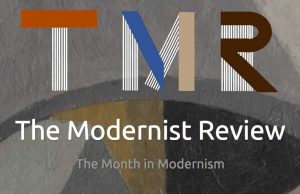 “How do modernist literary motifs, conventions, forms and concerns disseminate globally?” asks Dr Gavin Herbertson, of King’s College, London, in a short piece in The Modernist Review.
“How do modernist literary motifs, conventions, forms and concerns disseminate globally?” asks Dr Gavin Herbertson, of King’s College, London, in a short piece in The Modernist Review.
To explore this, he draws upon the cultural theories of Édouard Glissant. “Channelling Glissant,” he writes, “one could, for instance, consider the role Chinese and Japanese configurations of Buddhism played in relation to T. S. Eliot’s poetics.”
Herbertson examines the central arguments of ‘Tradition and the Individual Talent’ in this context, and perceives a contradiction, which “undermines Eliot’s own model, but is well accounted for by a Glissant-inflected paradigm.”
His short essay is here.
———————————————————————————————————-
Works on ‘The Waste Land’ republished as three separate books, March 2025
The works on ‘The Waste Land’ by WK Brannigan are being republished as three separate books.
A Modern Eve is described as “exploring the universal, mythic aspects of the typist in her relationship to the Hellenic poet Sappho and the Hebraic myth of Eve”.
The Dark Adam of Modernity “reveals the links between the carbuncle eyes of Satan in Paradise Lost, the sacred carbuncle gem in the Church of Magnus Martyr, and the clerk of The Waste Land.”
The Primal Chorus of the Sacred Wood “looks further into the distant past of humanity in The Waste Land, to the genesis of primeval culture. It explores how the beginnings of rhythm, dance, music, language and myth are represented in the poem, and how that flows into modernity.”
William K Brannigan completed an MA by Research at Durham University on Anarchy and the Violet Hour: Eve, Adam and the Cult of the Individual in The Waste Land, which provided the basis for the works, first published as two titles in May 2024 – see the 2024 News Archive for details. The works are now being published in three paperbacks by alep press, and details of each are here.
———————————————————————————————————-
Ralph Fiennes, Tarkovsky and ‘Little Gidding’, March 2025
 Ralph Fiennes quotes from ‘Little Gidding’ in a short video item on art movies.
Ralph Fiennes quotes from ‘Little Gidding’ in a short video item on art movies.
In the video, the actors Ralph Fiennes and Juliette Binoche, co-stars of The Return, select their favourite movies from the Criterion Collection of DVDs.
Selecting The Mirror by Andrey Tarkovsky, Binoche relates how Tarkovsky said “You know what? I found a new way to edit films and to put the end at the beginning. And that’s my new way of making films.”
“What we call the beginning is often the end,” responds Fiennes. “The end is where we start from.”
The short video is here and this exchange takes place appropriately near the end at 3:32.
———————————————————————————————————-
‘The Waste Land’ City church launches appeal, March 2025
 The Church of St Magnus the Martyr, the City of London church known to many through ‘The Waste Land’, has launched an appeal for the restoration of its interiors.
The Church of St Magnus the Martyr, the City of London church known to many through ‘The Waste Land’, has launched an appeal for the restoration of its interiors.
Eliot wrote in ‘The Waste Land’ that “the walls of Magnus Martyr hold/Inexplicable splendour of Ionian white and gold”. He also declared that “the interior of St. Magnus Martyr is to my mind one of the finest among Wren’s interiors.”
“The interiors at St Magnus were last fully repaired and redecorated in 1995-1996,” say the Rector and Churchwardens. “Since then almost thirty years of general wear and tear have taken their toll and the interiors are now in desperate need of redecoration.
“The works will revitalise and safe-guard a sacred space that is in full daily use for worship and prayer, as well as improving the church’s offer to visitors and tourists into the next 100 years.”
Full details of the appeal are here.
———————————————————————————————————-
Celebrating the centenary of T.S. Eliot joining Faber, March 2025
 An event at the London Review of Books, featuring poet and critic Mark Ford; Editor of Eliot’s Letters Professor John Haffenden; former Faber managing director Toby Faber; and Senior Lecturer at the University of Brighton Aakanksha Virkar, will mark the 100th anniversary on April 23rd of T. S Eliot entering the world of publishing by joining Faber & Gwyer.
An event at the London Review of Books, featuring poet and critic Mark Ford; Editor of Eliot’s Letters Professor John Haffenden; former Faber managing director Toby Faber; and Senior Lecturer at the University of Brighton Aakanksha Virkar, will mark the 100th anniversary on April 23rd of T. S Eliot entering the world of publishing by joining Faber & Gwyer.
Full details are on our Events page.
———————————————————————————————————-
The Modernist Long Poem – Conference and Call for Papers, March 2025
 There is a Call for Papers for an autumn conference on the Modernist Long Poem.
There is a Call for Papers for an autumn conference on the Modernist Long Poem.
The conference will be hosted by Northeastern University London on October 25th 2025, and abstracts for papers are invited by 25th April 2025.
“Just over a century after the publication of T.S. Eliot’s The Waste Land, the modernist long poem continues to be the focus of critical response and varied definitions,” say the organisers. “In the post-war decade, the long poem would become the dominant form of modernist poetics.”
“We hope to include papers foregrounding a wide range of approaches to and aspects of the long modernist poem.”
The keynote lecture for the conference will be delivered by Professor Steven Matthews (University of Reading), on ‘Logics of the Imagination: Structure in Eliot, Aldington, and H.D.’.
Full details of both the conference and the call for papers are here
———————————————————————————————————-
Richard Harries on T.S. Eliot’s Prose, February 2025
 Richard Harries, former Bishop of Oxford, has reviewed The Collected Prose of T.S. Eliot in the Church Times.
Richard Harries, former Bishop of Oxford, has reviewed The Collected Prose of T.S. Eliot in the Church Times.
“It is not just that [Eliot] seems to have read everything,” Harries writes, “he is capable of making the most astute judgements between one work and another, expressed in a way that is utterly lucid and often laced with irony.”
Harries, who gave the 2024 Annual TS Eliot Lecture presented by the Society, highlights “Eliot’s growing admiration for the writings of those who followed St Thomas Aquinas”; shorter pieces from The Criterion and the Christian News-Letter; and “his short introductions to the great Anglo-Catholic conferences of the inter-war years.”
“There are many perceptive insights,” he observes. “For example, his definition of a sceptic as someone ‘who suspects the origins of his own beliefs . . . who suspects other people’s motives because he has learnt the deceitfulness of his own.’”
The full review can be read here.
———————————————————————————————————-
First issue of The Criterion sold, February 2025
 A copy of The Criterion, Vol 1 No 1, famously containing the first UK publication of ‘The Waste Land’, has been sold at auction.
A copy of The Criterion, Vol 1 No 1, famously containing the first UK publication of ‘The Waste Land’, has been sold at auction.
Described as “an excellent and very clean example overall”, the copy had an estimate of £1,500 to £2,000. It sold in a timed auction at Forum Auctions for £3,800, with an added buyer’s premium of 26% meaning £4,788 to its purchaser.
Details of the lot are here.
———————————————————————————————————-
Winter issue of Exchanges…, February 2025
 The Winter issue of our Society quarterly, Exchanges…, is now available for download.
The Winter issue of our Society quarterly, Exchanges…, is now available for download.
Its contributions from members include an item on an Eliot-based novel, A Passion for Tom; a visit to Kipling’s former home, revealing a connection to Eliot’s Skimbleshanks; and a fascinating find related to Eliot’s anonymous second book, Ezra Pound: His Metric and Poetry.
You can download this new issue here.
———————————————————————————————————-
C.K Stead on Eliot’s Collected Prose, February 2025
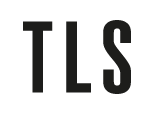 C.K. Stead, the New Zealand writer and critic now 92, has weighed into the ongoing discussion of Eliot’s prose in Letters to the Editor of the TLS.
C.K. Stead, the New Zealand writer and critic now 92, has weighed into the ongoing discussion of Eliot’s prose in Letters to the Editor of the TLS.
Stead writes that Stephen Romer, the TLS reviewer of The Collected Prose, “doesn’t suggest that Eliot’s progress as critic exactly matches his progress as poet, but I think it does.
“If Eliot had died leaving The Waste Land (the great English-language poem of its century), with his principal poetic eructations of that period, some finely lyrical, some sadly self-characterizing, some indelibly antisemitic, together with his critical writing of those years, he would still have been a major event in literary history, and we would have been spared the Eliot (as Wyndham Lewis put it) “disguised as Westminster Abbey”, the poems in which the authentic Eliot-self wrestled dismally with the Anglican Other”.
His letter can be read in full here.
———————————————————————————————————-
Eliot typescript posted online, February 2025
 As part of their centenary, the Virginia Quarterly Review has posted online, courtesy of the Albert and Shirley Small Special Collections Library at the University of Virginia, the first page of Eliot’s amended 13-page typescript of his essay, ‘Personality and Demonic Possession’ (1934).
As part of their centenary, the Virginia Quarterly Review has posted online, courtesy of the Albert and Shirley Small Special Collections Library at the University of Virginia, the first page of Eliot’s amended 13-page typescript of his essay, ‘Personality and Demonic Possession’ (1934).
This was Part III of After Strange Gods, the book which Eliot withdrew from publication. Described as “the least incendiary of the three lectures”, the essay appeared in VQR in January 1934.
The larger image in VQR is here and the essay itself is now in the online Complete Prose 5, 38 and in Collected Prose II, 795.
———————————————————————————————————-
T.S. Eliot, James Joyce, and ‘Little Gidding’, February 2025
An essay in the latest issue of Essays in Criticism considers ‘Double Parts: Eliot, ‘Little Gidding’, and the Approach to Joyce’.
‘Double Parts: Eliot, ‘Little Gidding’, and the Approach to Joyce’.
“There is good reason to propose,” writes David Pascoe, of Utrecht University, “that, as a result of the ‘sharpening of personal poignancy’ which, at an early stage in its composition Eliot had told Hayward Section II of ‘Little Gidding’ still required, the ‘familiar’ figure of Joyce should be encountered too, ‘a double part’ within its ‘compound ghost’.”
The essay traces the closeness and complexity of the friendship between Eliot and Joyce, as Eliot pursued across meetings, meals and letters the completion of Joyce’s Work in Progress, which Faber eventually published as Finnegans Wake; “a friendship… which would sustain Joyce as the most turbulent period in his life began.”
He explores the notion of a ‘double standard’ which Eliot asserted during a lecture in Dublin, that whatever Joyce’s “conscious attitude” towards his faith, because of his education “The mind exhibited in the work remains profoundly Catholic and religious”.
He considers whether the ‘one who died blind and quiet’ might be Joyce as well as Milton. And he highlights a series of echoes between ‘Little Gidding’ and Finnegans Wake, “a text in which, famously, the ‘double ends’ joined, that final form also recalled in the opening lines of ‘Little Gidding’s closing section: ‘What we call the beginning is often the end / And to make an end is to make a beginning / The end is where we start from’.”
The essay is published in Essays in Criticism (Vol 74 Issue 4) here.
———————————————————————————————————-
Observations inspired by The Collected Prose, February 2025
 The review in the TLS of The Collected Prose of T.S. Eliot (scroll down three items) has resulted in three Letters to the Editor in the subsequent issue.
The review in the TLS of The Collected Prose of T.S. Eliot (scroll down three items) has resulted in three Letters to the Editor in the subsequent issue.
Dominic Hartley laments the absence of a critical apparatus, and highlights “an absolute howler” which Eliot commits in his essay on Thomas Heywood but which passes unremarked. “There are more of these surprising lapses,” he writes, “of which even the learned readers who have forked out £200 for the handsome Faber set may not be aware.”
Sam Milne writes to counter the reviewer’s observation that Eliot had an “allergy to DH Lawrence and his works”. Milne quotes Eliot responding to a comment by Lawrence about “the essence of poetry”, in which Lawrence calls for “stark, bare, rocky directness of statement”. Eliot remarks that “This speaks to me of that at which I have long aimed,” and concludes that “Lawrence’s words mean this to me, that they express to me what I think that the forty or fifty original lines that I have written strive towards.”
Finally, Bernard Richards, of Brasenose College, Oxford, considers the reviewer’s remarks on what Eliot thought about the identity and functioning of a poet. Richards recalls being told of a party at which Eliot had requested “ice cream and hot chocolate sauce”.
“A guest said, ‘I can’t imagine how you’d like that’.
“Eliot replied, ‘You’re not a poet; of course you can’t imagine it.’”
The TLS Letters to the Editor page (£) is here.
———————————————————————————————————-
“She’s a story worth telling” – Emily Hale and TS Eliot, January 2025
 In an interview for HUB History, author Sara Fizgerald provides a summary of the life of Emily Hale and her relationship with T.S. Eliot, drawn from her recent book, The Silenced Muse: Emily Hale, T.S. Eliot and the Role of a Lifetime.
In an interview for HUB History, author Sara Fizgerald provides a summary of the life of Emily Hale and her relationship with T.S. Eliot, drawn from her recent book, The Silenced Muse: Emily Hale, T.S. Eliot and the Role of a Lifetime.
A Boston-based podcast, “In every episode of HUB History, host Jake shares a fascinating story from the long history of Boston.” In this episode, “From Hale’s upbringing in Chestnut Hill to their first flirtation in a Harvard Square parlor, Fitzgerald traces the intertwining lives of Hale and Eliot over a half a century that revolves around the intellectual center of gravity that is Boston.”
Conveniently, the HUB History site provides not only a link to the podcast, but also a transcript of the interview. Both are available here.
———————————————————————————————————-
‘Child ghosts’ in the gardens of Burnt Norton, January 2025
 An essay by Catherine Butler, ‘Heard but not seen: Gardens and their child ghosts in Rudyard Kipling, T. S. Eliot and Lucy M. Boston’, argues that “All three understand the complexity and importance of gardens as places poised between nature and artifice, present and past, childhood and experience.”
An essay by Catherine Butler, ‘Heard but not seen: Gardens and their child ghosts in Rudyard Kipling, T. S. Eliot and Lucy M. Boston’, argues that “All three understand the complexity and importance of gardens as places poised between nature and artifice, present and past, childhood and experience.”
Catherine Butler is a Professor of English Literature at Cardiff University, specialising in children’s literature. She argues that the influence of Rudyard Kipling’s story ‘They’ upon ‘Burnt Norton’ “should not be underestimated”, and identifies “significant continuities” between the two works.
The essay can be downloaded in PDF from ORCA: Online Research at Cardiff, and the section Garden Ghosts in ‘Burnt Norton’begins on page 16.
———————————————————————————————————-
The TLS reviews The Collected Prose of T.S. Eliot, January 2025
 In the TLS of 24th January, Stephen Romer provides a full-length review of The Collected Prose of T.S. Eliot.
In the TLS of 24th January, Stephen Romer provides a full-length review of The Collected Prose of T.S. Eliot.
Much of the review considers the content and structure which result from Archie Burnett’s editorial criteria, with inevitable comparison to the online Complete Prose. However, Romer goes on to look at the “most astute” activity contained within the first volume, and examines in particular Eliot’s previously uncollected essay on ‘Modern Tendencies in Poetry’.
“Much in the second and third volumes,” he then writes,”…is heavy going. Once the settled belief is in, the existential tension goes out, and this is reflected in the prose, which often turns into long-winded polemic and attempts at defining ‘What Precisely and If and Perhaps and But’.” He detects a “chill whiff of churchiness” in the “endless” pages of support for Christian institutions.
“Taking the critical prose as a whole,” he asks, “if we seek for constants in his thought, or for things of permanent value, to use a favourite phrase, what might we find? Brilliant insights, to be sure; a genius for the apt quotation; forensic analysis of particular examples. In short, Eliot demonstrates literary discrimination of the first order, carried out over an immense range.” And he observes that “unlike other minds, Eliot never in fact lays down exclusive prescriptions about what poetry is or ought to be.”
The full review (£) is here – see the archived News 2024 page (below) for links to other reviews (August 2024), and to July 2024 for details of the content and volumes of The Collected Prose.
———————————————————————————————————-
T.S. Eliot and Kelham Hall, January 2025
 A book by Vincent Strudwick traces the influence of the Society of the Sacred Mission on T. S. Eliot’s poetry and personal spiritual journey.
A book by Vincent Strudwick traces the influence of the Society of the Sacred Mission on T. S. Eliot’s poetry and personal spiritual journey.
Eliot’s Transitions: T. S. Eliot’s Search for Identity and the Society of the Sacred Mission at Kelham Hall examines the influence of members of the Society of the Sacred Mission at Kelham Hall on T. S. Eliot’s poetics, cultural criticism and his search for identity. It focusses particularly on Eliot’s friendship with Br George Every SSM, and the correspondence between them that led to a deep intellectual and spiritual relationship.
Reverend Canon Dr Vincent Strudwick was awarded a Lambeth doctorate in 2009 and is a fellow of Rewley and Kellogg Colleges, Oxford
“The result is a delicate journey through the growing personal and spiritual relationship between a great theologian and Christian writer, and one of the greatest modern poets and essayists.”
Published by SLG Press with a cover price of £9.50, full details are here.
———————————————————————————————————-
The Cocktail Party inscribed to Allen Tate, January 2025
 A First Edition of The Cocktail Party, inscribed by Eliot to the American poet, essayist and commentator Allen Tate, is being sold by Sotheby’s.
A First Edition of The Cocktail Party, inscribed by Eliot to the American poet, essayist and commentator Allen Tate, is being sold by Sotheby’s.
The inscription “To Allen Tate from T.S. Eliot” is dated “6.iii.50”, significant because this Faber & Faber First Edition of the play was not published until three days later, on 9th March 1950.
Tate was a close friend of Eliot, and collected essays and personal reminiscences from contemporary literary figures after Eliot’s death; these appeared first in the Sewanee Review, and subsequently in Tate’s book T.S. Eliot: The Man and His Work (Chatto & Windus, 1967).
In his own postscript to that collection he wrote, “To see his maestro, Dante had to ‘lift his eyelids a little higher’, and that was what I knew, after January fourth, I had been doing in the thirty-six years of an acquaintance that almost imperceptibly became friendship. I looked up to him, and in doing so I could not feel myself in any sense diminished.”
The book is offered by Sotheby’s in a private sale here.
———————————————————————————————————-
Filmed performance of Four Quartets, January 2025
 A film of a performance from memory of Four Quartets by the actor, theatre impresario and West End producer Peter Wilson has been made available online. The film had its world premiere at the Autumn Festival of Norfolk last year.
A film of a performance from memory of Four Quartets by the actor, theatre impresario and West End producer Peter Wilson has been made available online. The film had its world premiere at the Autumn Festival of Norfolk last year.
“In the last few years of this life, before his untimely death from cancer in 2023, Peter Wilson took on the challenge of learning the poems and giving public performances of them,” explain Dartmouth Films. “In this film, directed by his friend David Rocksavage and set in West Rudham church in Norfolk, Peter gives his last public performance as an actor, capturing the inner voice of what was the poet’s own final poetic statement.”
Details of the film are here and it can be viewed here.
———————————————————————————————————-
On Margate Sands, January 2025
 The Nayland Rock Shelter in Margate, where TS Eliot wrote part of The Waste Land, has been reopened after a £90,000 refurbishment.
The Nayland Rock Shelter in Margate, where TS Eliot wrote part of The Waste Land, has been reopened after a £90,000 refurbishment.
The Grade II listed shelter, offering a view of Margate Sands, was constructed between 1872 and 1896. It was previously restored in 2000, but was severely damaged by vandalism and fire in 2023. The shelter was closed in April 2024, and work has included repairing the wooden flooring, and removing the fire-damaged seating area, and replacing it in line with the structure’s listed status. Repairs to the roof were completed earlier this month, and lights have been installed inside the shelter, activated by an automatic timer, to deter further anti-social behaviour.
“I have done a rough draft of part of part III [of The Waste Land ],” wrote Eliot from Margate in a letter of November 1921, “but do not know whether it will do…I have done this while sitting in a shelter on the front – as I am out all day except when taking rest.”
“The shelter is a genuine part of Margate’s coastal heritage,” said Councillor Steve Albon, “and its links with TS Eliot make it even more important.” The shelter is now open again to visitors.
———————————————————————————————————-
T.S. Eliot’s letters and photos from his “very memorable” visit to Little Gidding, January 2025
 Letters and photographs with significant connections to Eliot’s visit to Little Gidding are up for auction. The letters are to Hugh Fraser Stewart and his wife Jessie, who took Eliot on his only visit in 1936.
Letters and photographs with significant connections to Eliot’s visit to Little Gidding are up for auction. The letters are to Hugh Fraser Stewart and his wife Jessie, who took Eliot on his only visit in 1936.
In a handwritten letter to Mrs Stewart, dated “29 V 36”, on Faber & Faber notepaper, Eliot describes his visit to Little Gidding as “a very memorable day in my life”, and encloses “my bad snapshots” of the church. There are four 70 x 45mm black and white photographs of St John’s Church, Little Gidding (plus one unidentified), presumably taken by Eliot himself.
And in a subsequent typed letter dated “3 January 1941” to “My dear Stewart”, Eliot refers to “a set of four poems”, “of which the last is intended to be ‘Little Gidding’. So you see that the excursion on which you took me was one of permanent importance to me.”
Eliot also thanks Stewart for his comments on an unnamed poem: “one needs all the encouragement one can get, in these days,” he writes, “for continuing this strange occupation of verbal play which never seems to have any immediate value”.
The letters and photographs are in The Oxford Library Sale at Mallams, Oxford on 30th January, with an estimate of £3,000 – £5,000. Full details and images are here.
UPDATE: The lot sold for £5,600  (£7,000 including buyer’s premium)
(£7,000 including buyer’s premium)
———————————————————————————————————-
Eliot etching for sale, January 2025
 An example of the 1934 portrait of TS Eliot by Edgar Holloway (1914-2008) is up for auction.
An example of the 1934 portrait of TS Eliot by Edgar Holloway (1914-2008) is up for auction.
The framed etching in wove is numbered 35 out of an edition of 75, and is signed in pencil.
Edgar Holloway achieved critical acclaim while still in his teens, with Eliot, Stephen Spender and Herbert Read among the personalities he captured on copper and paper. By the age of twenty, he had been given two solo exhibitions in London, his work had been purchased by the V&A and the British Museum,
The estimate by auctioneers Roseberys London is £100-£200, and details are here.
UPDATE: This item went unsold.
———————————————————————————————————-
International TS Eliot Society Call for Papers, January 2025
 The International TS Eliot Society has issued a Call for Papers to be presented at its Annual Meeting, to be held at Trinity College, Dublin from 2nd – 5th July 2025.
The International TS Eliot Society has issued a Call for Papers to be presented at its Annual Meeting, to be held at Trinity College, Dublin from 2nd – 5th July 2025.
“Clearly organized proposals of about 300 words (submitted in MS Word, Google Docs, or PDF form), on any topic reasonably related to Eliot, along with brief biographical sketches, should be emailed by April 1st to tseliotsociety@gmail.com, with the subject heading “conference proposal.” Proposals related to Eliot’s connections to Ireland and Irish writers are especially welcome.
“Each year the Society presents the Fathman Young Scholar Award to the best paper given by a new Eliot scholar. Graduate students and recent PhDs are eligible (degree received in 2021 or later for those not yet employed in a tenure-track position; 2023 or later for those holding a tenure-track position). If you are eligible for the award, please mention this fact in your submission. The award, which includes a monetary prize, will be announced at the final session of the meeting.”
The event will also offer discussion-based peer seminars (on its first day), and the event’s keynote speaker will be Fran Brearton, Professor of English at Queen’s University Belfast. Primary conference lodging is being provided by Trinity College at special conference rates.
The full CFP is here, and details of the meeting, which will be updated as confirmed, are here.
———————————————————————————————————-
News 2024 is archived – click here
News 2023 is archived – click here
News 2022 is archived – click here
News 2021 is archived – click here
News 2020 is archived – click here
News 2019 is archived – click here
News 2018 is archived – click here
News 2017 is archived – click here
News 2016 is archived – click here
News 2015 to 2012 is archived – click here

